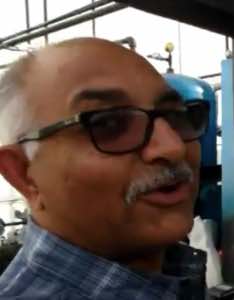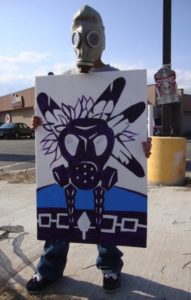TIMELINE PART 3
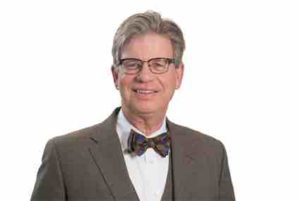
10/03/08 : ‘GODFREY & KAHN ANNOUNCES THE ADDITION OF CARL J. ARTMAN AS SHAREHOLDER IN ITS MILWAUKEE OFFICE; With extensive national experience, Artman will expand the firm’s Indian Nations Practice Group’
Milwaukee, Wisconsin (October 3, 2008) – The law firm of Godfrey & Kahn, S.C. is pleased to announce the addition of Carl J. Artman as shareholder in its Indian Nations and Environmental & Energy Practice Groups.
Prior to joining Godfrey & Kahn, Artman served as the Assistant Secretary of Indian Affairs and the Associate Solicitor for Indian Affairs for the United States Department of the Interior in Washington, D.C.
Prior to his appointments in Washington, Artman served as Chief Legal Counsel for the Oneida Tribe of Indians of Wisconsin in Green Bay.
“Carl will be a great addition to both our Indian Nations and Environmental & Energy Practice Groups,” said Rick Bliss, Managing Partner of Godfrey & Kahn.
“With his extensive background, Carl will be able to offer a broad range of legal services to a variety of our clients, especially in the area of Indian affairs. Carl has represented clients in environmental, corporate, emerging technologies, telecommunications and bankruptcy matters. We are very pleased to have him on board with us.”
Bliss noted that Artman plans to expand the firm’s Indian Nations practice. The mission of the firm’s Indian Nations Practice Group is to support tribal governments and their attorneys in protecting tribal sovereignty, enhancing tribal self-government and promoting the welfare of tribal members.
“Godfrey & Kahn supports organizations dedicated to improving the quality of life in Indian country and I am confident that Carl will be a great asset in accomplishing this mission,” added Bliss.
Artman currently serves on the Board of Directors for the Library of Congress’s American Folklife Center. He has also served on the Board of the Presidential Board of Advisors on Tribal Colleges and Universities, Oneida Nation Electronics, Qubit Technology Inc., Airadigm Communications, Inc. and Personal Communications Industry Association. His past involvement includes serving as Chairman of the Tribal Management Advisory Committee and the Tribal Budget Advisory Committee. He also served as a member of the U.S. Delegation to the United Nation’s Convention to Eliminate Racial Discrimination.
Artman received his J.D. degree from Washington University School of Law and his LLM from the University of Denver School of Law in Environment and Natural Resources. He received his MBA from the University of Wisconsin School of Business and his B.A. from Columbia College.

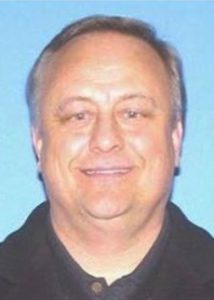
![]() 10/08/08 : October 8, 2008 Defendants’ Evergreen Development, LLC and Ronald Van Den Heuvel’s Notice of Retainer, signed by C. David Stellpflug, Stellpflug Law S.C., Brown Co. Case No. 08CV2265, [Wally Hilliard & Family] Hilliard Limited Partnership [Godfrey & Kahn] v. Ronald H. Van Den Heuvel & Evergreen Development, LLC
10/08/08 : October 8, 2008 Defendants’ Evergreen Development, LLC and Ronald Van Den Heuvel’s Notice of Retainer, signed by C. David Stellpflug, Stellpflug Law S.C., Brown Co. Case No. 08CV2265, [Wally Hilliard & Family] Hilliard Limited Partnership [Godfrey & Kahn] v. Ronald H. Van Den Heuvel & Evergreen Development, LLC
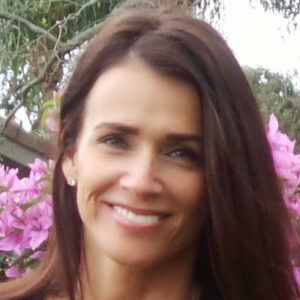 10/27/08 : KYHKJG, LLC registered w/ WDFI; Restored to Good Standing & changed Registered Agent to Kelly Van Den Heuvel, Principal Office: 2077-B Lawrence Dr., De Pere, WI on 03/27/12; Dissolved 12/27/16
10/27/08 : KYHKJG, LLC registered w/ WDFI; Restored to Good Standing & changed Registered Agent to Kelly Van Den Heuvel, Principal Office: 2077-B Lawrence Dr., De Pere, WI on 03/27/12; Dissolved 12/27/16
 10/29/08 : October 29, 2008 DECISION, U.S. Court of Appeals, 7th Circuit, Cases Nos. 07-3863 & 07-3864, AIRADIGM COMMUNICATIONS INC.; Debtor, Airadigm Communications Inc. & Data Systems Inc., Appellants, v. Federal Communications Commission, Appellee…
10/29/08 : October 29, 2008 DECISION, U.S. Court of Appeals, 7th Circuit, Cases Nos. 07-3863 & 07-3864, AIRADIGM COMMUNICATIONS INC.; Debtor, Airadigm Communications Inc. & Data Systems Inc., Appellants, v. Federal Communications Commission, Appellee…
in which the Oneida Nation of Wisconsin’s ‘Oneida Economic Development Authority‘
[OEDA] LOST OVER $95 MILLION
on AIRADIGM…
and former Oneida Law Office
had served as Airadigm’s
 10/30/08 : CONFIDENTIAL – October 30, 2008 AUDIT of Oneida Seven Generations Corp. and subsidiaries by the ONWI Internal Audit Dept.,
10/30/08 : CONFIDENTIAL – October 30, 2008 AUDIT of Oneida Seven Generations Corp. and subsidiaries by the ONWI Internal Audit Dept.,
That ONWI Internal Audit Dept. Report was later referenced in non-Tribal OSGC Board member Paul Linzmeyer’s November 2011 Email to Fmr. OBC Chair Ed Delgado’s Elder Advisor Yvonne Metivier, Subject: “Actions ED should take” to protect GTC from Tribally-owned OSGC.
Fmr. OBC Chair Ed Delgado failed to heed the advice of non-Tribal OSGC Board member Paul Linzmeyer in 2011 – resulting in tens of millions of dollars in losses to GTC due the fraud schemes of OSGC and Ron Van Den Heuvel.




 11/05/08 : November 05, 2008 Deposition of Ronald H. Van Den Heuvel by Atty. Ross Nova of Godfrey & Kahn [excerpt, pp. 13–16], Brown Co. Case No. 08CV2265, Hilliard Limited Partnership [Godfrey & Kahn] v. Ronald H. Van Den Heuvel & Evergreen Development, LLC
11/05/08 : November 05, 2008 Deposition of Ronald H. Van Den Heuvel by Atty. Ross Nova of Godfrey & Kahn [excerpt, pp. 13–16], Brown Co. Case No. 08CV2265, Hilliard Limited Partnership [Godfrey & Kahn] v. Ronald H. Van Den Heuvel & Evergreen Development, LLC
[Ron Van Den Heuvel]: I have that agreement with every one of them. I turn these into notes because it’s better for them. But all of them approved me entering into the bank debt that said we could not pay shareholders before the bank debt was paid. So I can’t just skirt this, turn it into a note, and now pay the note because, I mean, you can’t do that. It would be against the covenants with the banks. I mean, I can’t pay equity–– I can’t pay equity before I pay the bank debt. It’s just in the bank note.
[Atty. Ross Nova of Godfrey & Kahn]: You referred to sort of an understanding among the members of Evergreen [Development, LLC,] to renew these notes until the assets are sold. Is there anything in writing that evidenced this understanding you had with either Hilliard Limited Partnership or any other member of Evergreen Development, LLC, at any time?
[RVDH]: The only thing that’s in writing is the same thing that’s in Tissue Products Technology and in Eco-Fibre, and that is that I had a shareholders’ approval and board of directors’ approval when they were members of Eco-Fibre and when they were members of TPTC to enter into the bank debt that is still in place. And very clearly everyone understands they cannot get any money out of any of the companies directly or indirectly until the assets are sold.
[G&K]: Okay. That was actually a yes or no question, Mr. Van Den Heuvel, so I’m trying to make this go faster.
[RVDH]: Okay.
[G&K]: So I’ll ask the question one more time. You referred to an understanding that you had with the members of Evergreen Development, LLC, to renew various promissory notes until the assets of Evergreen Development were sold. Is that understanding reduced to writing?
[RVDH]: I don’t believe so, but I’m not sure.
[G&K]: Okay. What would you need to do to verify your understanding?
[RVDH]: I’d have to go through five years of e-mails.
[G&K]: Okay. I’ll just request that you do that to verify your understanding. So we understand, as you sit here today, you don’t know of any writing evidencing the understanding we’ve been referring to, and you’re going to let me know if your understanding is incorrect by reviewing e-mails so that the next time we meet, you can deny your understanding if it turns out you’re mistaken, correct?
[RVDH]: Incorrect. The bank documents and the two resolutions from the shareholders and the board of directors definitely says I cannot buy anybody out without paying them in full.
[G&K]: The shareholders and board of directors of what entity?
[RVDH]: Eco-Fibre [formerly Re-Box] and TPTC [Tissue Products Technology Corp.]
[G&K]: Okay. I’ll request copies of those documents.
[RVDH]: Okay.
[G&K]: Is there anything — any board of directors or members vote or writing evidencing an understanding between you and the members of Evergreen Development, LLC, to renew the promissory notes until the assets of Evergreen are sold?
[RVDH]: Other than the fact it just keeps happening. They understand. But no, I don’t think anything’s in writing. …
[G&K]: Is it your testimony then that you had an understanding with the Hilliard Limited Partnership that it would agree to renew the promissory note represented in Exhibit 1 until such time as the assets of Evergreen Development, LLC, were sold?
[RVDH]: Yes.
[G&K]: Okay. Was that ever put in writing?
[RVDH]: I’m not sure.
[G&K]: When was that understanding reached with Hilliard Limited Partnership?
[RVDH]: I talked to the guys many a time. And when we turned it from stock to a note, that was the understanding. I mean, they wanted on their balance sheet a note instead of stock so that they could value it, and I agreed to do it through an arm’s length transaction with full awareness that there was no way to pay it until the assets were sold and that I would work very diligently to sell the assets and not receive a wage from either one of the companies. I agreed to it.
[G&K]: With whom on behalf of Hilliard Limited Partnership did you reach this understanding to renew the promissory note represented by Exhibit 1?
[RVDH]: Mostly with Dan Hilliard, but I did talk to Neal Maccoux several times on it also.
[G&K]: And what role does Dan Hilliard play with Hilliard Limited Partnership?
[RVDH]: I don’t know.
[G&K]: Okay.
[Ron Van Den Heuvel]: He works for me though.
[Atty. Ross Nova of Godfrey & Kahn]: Okay. Do you know if Dan Hilliard‘s a member of Hilliard Limited Partnership? … [end of Exhibit excerpt]
 11/07/08 : According to the September 20, 2016 Superseding Indictment, Docket No. 16-CR-064, USA v. Ron & Kelly Van Den Heuvel and Paul J. Piikkila
11/07/08 : According to the September 20, 2016 Superseding Indictment, Docket No. 16-CR-064, USA v. Ron & Kelly Van Den Heuvel and Paul J. Piikkila
3. On or about November 7, 2008, [Paul] Piikkila authorized two loans of $250,000 and $70,000, respectively, to KYHKJG, LLC.
11/13/08 : Daily Iberian, ‘Council delays decision on suit’
The parish contracted Bedminster [International] to develop and build a composting and waste management facility near the wastewater treatment plant in New Iberia, but could not reach an agreement on where the site would be located. The parish paid $77,028 to Bedminster for the first phase of the project, which included a study and report on the proposed project, but that was the only part of the project completed. The Parish Council voted to cancel its contract with Bedminster for an accelerated composting facility months ago, but Bedminster officials still have not signed off on it.
11/15/08 : GENERAL TRIBAL COUNCIL SPECIAL MEETING re: OSGC & CORPORATE ACCOUNTABILITY

- November 15, 2008 GTC MEETING MINUTES
- November 15, 2008 GTC MEETING AUDIO:
During the GTC Special Meeting re: Petitions by Madelyn Genskow, GTC voted to adopt the following Resolutions which OBC & OSGC HAVE IGNORED & REFUSED TO OBEY:
- GTC Resolution 11-15-08-A, Non-Confidentiality Information
Now Therefore Be It Resolved, that no committee or tribal attorney may force an Oneida committee, board or commission to keep secret from other tribal members information that is not of a confidential nature or force them to sign an agreement in order to serve on a committee, board or commission of the Oneida Tribe.
- GTC Resolution 11-15-08-B Directing Review of Corporate Charters
Now Therefore Be It Resolved that the [OBC] is directed to withhold future financial distributions to any corporation of the Tribe until the following actions have been taken
1. The [OBC] is directed to amend all corporate charters to require submission of annual and semi-annual reporting which contains the following information and/or documents:
a. the business done and intended to be done by the corporation
b. material changes and developments since the last report in the business, described,
c. any material pending legal proceedings to which the corporation is a party, and
d. financial statements of the corporation including a consolidated balance sheet and consolidated statement of income and source and application of funds.
2. The [OBC] is directed to review all corporate entities regarding finances and operations to determine the effectiveness and efficiencies of those corporate entities. A report on corporate entities is directed to be included in the Annual [GTC] meeting materials, or earlier if determined by the [OBC], to be needed.
- GTC Resolution 11-15-08-C, Treasurer’s Report to include all Receipts and Expenditures and the Amount and Nature of all Funds in the Treasurer’s Possession and Custody
Now Therefore Be It Resolved, that the Oneida General Tribal Council hereby directs that all Treasurer reports hereinafter include an independently audited annual statement that provides the status or conclusion of all the receipts and debits in possession of the Treasurer of the Tribe including, but not limited to, all corporations owned in full or in part by the Tribe, and
Be It Further Resolved, that the Oneida General Tribal Council hereby directs that all Treasurer’s reports to the Oneida General Tribal Council at the semi-annual and annual Oneida General Tribal Council meetings hereinafter include an independently audited annual financial statement that provides the status or conclusion of all receipts and debits in possession of the Treasurer of the Tribe and including, but not limited to component units (Tribally chartered corporations and autonomous entities, limited liability companies, state chartered corporations, any tribal economic development authority, boards, committees and commissions, vendors and consultants) owned in full or in part by the Tribe, and
Be It Further Resolved, that no “agent” of the Tribe shall enter into any agreement with any corporation that prohibits full disclosure of all transactions (receipts and expenditures and the nature of such funds) and that such an agreement is not binding to the Tribe, and
Be It Finally Resolved, that the Oneida General Tribal Council hereby directs implementation of this resolution at the next regular Oneida General Tribal Council meeting or at such special meeting of the Oneida General Tribal Council whereby a Treasurer’s report is requested.
- GTC Resolution 11-15-08-D, General Tribal Council Directives
Now Therefore Be It Resolved, that the [OBC] shall see to it that all Oneida [GTC] directives back to 1994 plus Resolution 07-06-93-A must be carried out by the end of fiscal year 2010.
Be It Further Resolved, Oneida General Tribal Council directs the Legislative Operating Committee to develop an amendment to the removal law which identifies that an elected official is subject to removal for failure to carry out a [GTC] directive and that this be presented to the Oneida General Tribal Council no later than the July 2009 semi-annual meeting.
The OBC & OSGC TREACHEROUSLY and TREASONOUSLY REFUSES TO COMPLY with GTC’s DIRECTIVES.

11/21/08: November 21, 2008 PHASE 2 PROJECTED CLOSING STATEMENT of RON VAN DEN HEUVEL’s company ENVIRONMENTAL ADVANCED RECLAMATION TECHNOLOGY HQ, LLC – E.A.R.T.H. – EXHIBIT from Ron Van Den Heuvel’s Responses to Plaintiff’s First Set of Requests to Admit, Brown Co. Case No. 08CV2265, Hilliard Limited Partnership v. Ron Van Den Heuvel & Evergreen Development, LLC
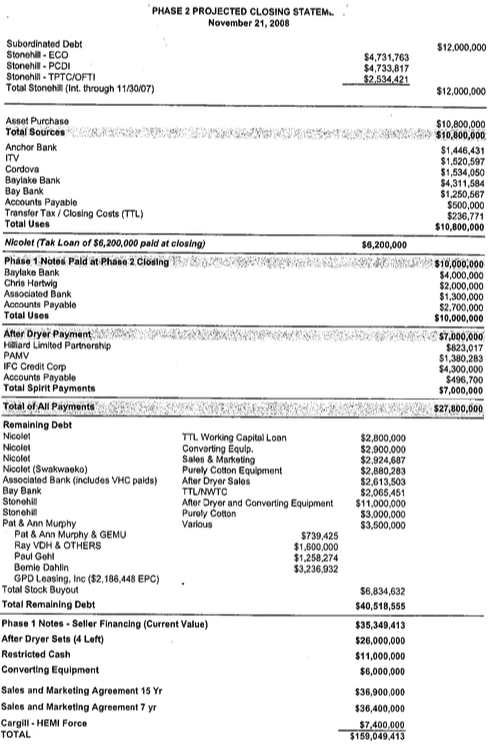
• MUST SEE LIST of Names and Amounts of Creditors regarding Subordinated Debt, Asset Purchases, Remaining Debt, including Various Banks including Anchor Bank; IFC Credit Corp.; Nicolet Bank; Baylake Bank; Associated Bank; Oneida Nation of Wisconsin-owned Bay Bank; Artley Skenandore Jr.’s Swakweko LLC; Hilliard Limited Partnership; Sharad Tak; Pat & Ann Murphy; Chris Hartwig; Stonehill Financial [SHF XII]


12/01/08 : December 1, 2008 Continued Deposition of Ronald H. Van Den Heuvel by Atty. Ross Nova of Godfrey & Kahn [excerpt], Brown Co. Case No. 08CV2265, Hilliard Limited Partnership [Godfrey & Kahn] v. Ronald H. Van Den Heuvel & Evergreen Development, LLC
Page 75:
[Ron Van Den Heuvel]: My office.
[Atty. Ross Nova of Godfrey & Kahn, counsel for Hilliard Limited Partnership]: Who was present?
[RVDH]: I wouldn’t know, but at one of these meetings Steve Peters was there. One of them I remember Andy [Hilliard] couldn’t make it because he was traveling somewhere. I don’t remember what meeting that was; but he maybe went to Africa. South Africa maybe. I shouldn’t say that, but that’s where my memory says he was at.
[G&K:] It was South Africa.
[RVDH]: It was, okay.
[G&K:] At any of the meetings regarding the alleged compromise and settlement referred to in 12 of your answer was anyone else present other than you, Steve Peters, Dan Hilliard, Andy Hilliard, and Neal Maccoux?
[RVDH]: No. It would be a combination of that group.
[G&K:] What date was this compromise and settlement reached?
[RVDH]: Right after the 4th of July, I want to say, sometime in that time period.
[G&K:] Before or after you signed the amended and restated promissory note?
[RVDH]: At or around that time. I can’t remember right when it was there. I know they wanted to review the mortgage, and we had given it to him a couple of … [page 75 ends]
Pages 77–78:
[Godfrey & Kahn:] Did you discuss the compromise and settlement with Andy — Andy Hilliard’s father [Wallace Hilliard] at all?
[Ron Van Den Heuvel:] Well, I didn’t. I said – I told him we had a tough situation going forward and financing was tough in this market; but I do believe that I used the term your boys are comfortable now that no assets will be sold underneath them without them being paid in full and/or that I’m diligently working hard and it’s a real project? And I showed him the off-take agreement signed by the Kraft family and Wausau Paper. They were fairly — I think everybody is very comfortable that this deal is progressing as fast as possible.
[G&K:] Did you have a conversation with the senior Hilliard [Wally] regarding the compromise and settlement referred to in paragraph 12 of your answer?
[RVDH:] The only thing I said to them is we came apart with a mortgage that should satisfy any issues that they had. I didn’t get into specifics. Wally and I were friends for a long time. I used to do all of his work, built all of his buildings as an architect, and did electrical work for him for years.
[G&K:] Did the Hilliard Limited Partnership agreement sign anything in writing documenting the compromise and settlement referred to in paragraph 12 of your answer?
[RVDH:] The only evidence I have that they did is they recorded the mortgage. So I don’t really have anything signed by them back because they always bring things for me to sign back to them and then they accepted it because they took the mortgage and filed it. So the mortgage went to them a couple times back and forth, and they wanted to talk about it and this and that. Finally, they agreed; and then shortly after they agreed they filed the mortgage.
[G&K:] When you say they agreed, who communicated to you that the Hilliard Limited Partnership agreed to the compromise and settlement contained in paragraph 12 of the answer?
[Ron Van Den Heuvel:] Well, Dan [Hilliard] negotiated or I shouldn’t say negotiated. Dan is the one who told me that they agreed, and basically a couple different times he said the mortgage was a good idea, and I know Dan is inside of our group working as hard as anybody to get this closed.
[Godfrey & Kahn:] Do you know what role Dan Hilliard has within Hilliard Limited Partnership? … [end of Exhibit excerpt]

![]() 12/08/08 : December 8, 2008 Defendants Evergreen Development, LLC, and Ronald Van Den Heuvel’s Responses to Plaintiff’s First Set of Requests to Admit, Brown Co. Case No. 08CV2265, Hilliard Limited Partnership [by Godfrey & Kahn] v. Ron Van Den Heuvel & Evergreen Development, LLC
12/08/08 : December 8, 2008 Defendants Evergreen Development, LLC, and Ronald Van Den Heuvel’s Responses to Plaintiff’s First Set of Requests to Admit, Brown Co. Case No. 08CV2265, Hilliard Limited Partnership [by Godfrey & Kahn] v. Ron Van Den Heuvel & Evergreen Development, LLC
NOW COME THE DEFENDANTS Evergreen Development, LLC, and Ronald Van Den Heuvel, by their attorneys, Stellpflug Law S.C., and hereby respond to Plaintiff’s First Set of Requests to Admit as follows:
1 . Admit that the attached hereto as Exhibit A is a true and correct copy of a Promissory Note in favor of the Plaintiff executed by the Defendants in the principal amount of Seven Hundred Fifty-Nine Thousand Six Hundred Thirty-Seven and 50/100 Dollars ($750,637.50)
RESPONSE: Admit.
2. Admit that no writing exists which relieves the Defendants from the terms of the Promissory Note.
RESPONSE: Deny. Defendants believe that there are e-mails between the parties that indicate an understanding that the Note is not payable until the sale of EcoFibre, Inc., is complete. Defendants are currently reviewing their files to locate said e-mails. Upon Defendants’ review of their files, this admission will be supplemented.
3. Admit that there is no oral agreement relieving the Defendants from their obligations under the Promissory Note.
RESPONSE: Deny. Defendant, Ronald Van Den Heuvel, on behalf of Evergreen Development, LLC, had discussions with the principals of Hilliard Limited Partnership wherein it was agreed that the Note would not be payable until such time as the sale of EcoFibre, Inc, was completed.
4. Admit that EcoFibre, Inc., is not a party to the Promissory Note.
RESPONSE: Admit.
5. Admit that the date of closing of the sale of EcoFibre, Inc., has not been set.
RESPONSE: Admit that a single date has not been set for the closing, but a time period for the closing has been set in that it is scheduled to close within the first quarter of 2009.
6. Admit that EcoFibre, Inc., does not have in place financing sufficient to complete the financing of its facility in DePere, Wisconsin.
RESPONSE: Admit that EcoFibre, Inc., does not have 100 percent financing in place but does have 50 percent in place at this time, with the expectation that the remaining financing will be in place within the first quarter of 2009.
7. Admit that there is no executed document by which proceeds of the sale of EcoFibre, Inc., will be paid directly to either Defendant.
RESPONSE: Admit.
8. Admit that there is no executed document by which proceeds of the sale of EcoFibre, Inc., will be paid directly to [Hilliard Family Partnership].
RESPONSE: Admit that no executed document is in place by which the proceeds of the sale of EcoFibre, Inc., will be paid directly to the Plaintiff. However, a payout sheet indicating where the proceeds of the sale will go and to whom has been drafted and is attached hereto indicating that the Plaintiffs will be paid out of said proceeds.
9. Admit that the debt of EcoFibre, Inc., exceeds the assets of EcoFibre, Inc.
RESPONSE: Deny that the debt of EcoFibre, Inc., exceeds its assets in that the sale of EcoFibre, Inc., will be paid directly to the Plaintiff. However, a payout sheet indicating where the proceeds of the sale will go and to who has been drafted and is attached hereto indicating that the Plaintiffs will be paid out of said proceeds.
10. Admit that interests secured by mortgages and/or other recorded documents in EcoFibre, Inc.’s, real property that are senior to the mortgage of the Plaintiff, exceed the value of that real property.
RESPONSE: Admit that the real property value of EcoFibre, Inc., is exceeded by other interests senior to the mortgage of the Plaintiff, but that when the total value of EcoFibre, Inc., which includes technology and intangibles, exceeds the debt of EcoFibre, Inc., including all secured interests including that of the Plaintiff.
11. Admit that there is no date certain by which the contemplated sale of EcoFibre, Inc., must be completed.
RESPONSE: Admit.
12. Admit it is possible that the sale of EcoFibre, Inc., will never occur.
RESPONSE: Admit.
13. Admit that more than one year has passed since the recording date of the mortgage referred to in Paragraph 12 of your Answer.
RESPONSE: Admit.
Dated this 8th day of December 2008.
STELLPFLUG LAW, S.C.
Attorneys for Defendants
By: C. David Stellpflug
12/21/08 : Daily Iberian, ‘Iberia sues to close Bedminster deal’
![]() 12/22/08 : December 22, 2008 Affidavit of Neal Maccoux w/ Exhibits in Support of Plaintiff’s Motion for Summary Judgment Against Defendants, Brown Co. Case No. 08CV2265, Hilliard Limited Partnership [by Godfrey & Kahn] v. Ron Van Den Heuvel & Evergreen Development, LLC
12/22/08 : December 22, 2008 Affidavit of Neal Maccoux w/ Exhibits in Support of Plaintiff’s Motion for Summary Judgment Against Defendants, Brown Co. Case No. 08CV2265, Hilliard Limited Partnership [by Godfrey & Kahn] v. Ron Van Den Heuvel & Evergreen Development, LLC
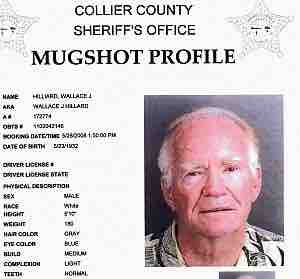
![]() 12/31/08 : December 31, 2008 Notice of Motion & Motion for Summary Judgment, and Brief w/ Exhibits in Support of Motion for Summary Judgment – including the December 31, 2008 Affidavit of Atty. Ross Nova, Godfrey & Kahn, S.C., re: Brown Co. Case No. 08CV2265, Hilliard Limited Partnership [by Godfrey & Kahn] v. Ron Van Den Heuvel & Evergreen Development, LLC
12/31/08 : December 31, 2008 Notice of Motion & Motion for Summary Judgment, and Brief w/ Exhibits in Support of Motion for Summary Judgment – including the December 31, 2008 Affidavit of Atty. Ross Nova, Godfrey & Kahn, S.C., re: Brown Co. Case No. 08CV2265, Hilliard Limited Partnership [by Godfrey & Kahn] v. Ron Van Den Heuvel & Evergreen Development, LLC
What the Defendents allege is that at some point prior to or contemporaneously with the execution of the promissory note, the Plaintiff orally agreed to modify the promissory note to provide for repayment upon the sale of a non-party business related to the Defendants, whenever that would occur, if ever. The Plaintiff sharply disputes this implausible allegation, but it immaterial. For reasons explained in this Brief, the promissory note cannot be modified by alleged oral agreements made prior to contemporaneously with the making of the promissory note. Because of the patrol evidence rule, a failure of consideration and the Statute of Frauds, any oral modification of the promissory note would be ineffective and any evidence in support thereof is inadmissible. Because the Defendants’ oral amendment defense must fail as a matter of law, the Plaintiff is entitled to summary judgmment. …
The oral “compromise and settlement” alleged by Defendants is utterly unsupported by consideration. This alleged oral modification would take the Note, whose principal value is over three quarters of a million dollars with a specific due date, and modify it to a payment date contingent upon the sale of a third party company, which Defendants agree may never happen! … As the Defendants have alleged, the Plaintiff received absolutely nothing in consideration for its oral “compromise and settlement” to modify a Note that would have paid Plaintiff an amount now worth $915,515.12 at a point in time that may never occur. …
The maker of the Note testified that the alleged “compromise and settlement” was entered into at various times between 2004 and 2008. … Assuming, arguendo, that the alleged “compromise and settlement” was entered into in 2006, the “compromise and settlement” cannot, by its terms, be completed within one year, threby making it subject to Wisconsin general Statute of Frauds … Thus, under Wisconsin law, the “compromise and settlement” is one that is significant enough that it must be in writing. The Statute of Frauds is, as its heart, an evidentiary requirement designed to prevent disputes and uncertainties about agreements between the parties. … A Statute of Frauds is, to put it plainly, designed to forestall exactly the kind of dispute that the Defendants attempt to raise in this case.
CONCLUSION
For the foregoing reason, the Court should grant summary judgment to the Plaintiff on its breach of contract claim and enter judgment against the Defendants in the amount of $929,592.45, plus the Plaintiff’s actual attorney’s fees and costs as allowed by the Note.
 December 31, 2008 Defendants Evergreen Development, LLC and Ronald Van Den Heuvel’s Amended Answer to Complaint, Brown Co. Case No. 08CV2265, Hilliard Limited Partnership [by Godfrey & Kahn] v. Ron Van Den Heuvel & Evergreen Development, LLC
December 31, 2008 Defendants Evergreen Development, LLC and Ronald Van Den Heuvel’s Amended Answer to Complaint, Brown Co. Case No. 08CV2265, Hilliard Limited Partnership [by Godfrey & Kahn] v. Ron Van Den Heuvel & Evergreen Development, LLC
NOW COME THE DEFENDANTS Evergreen Development, LLC, and Ronald Van Den Heuvel, by Stellpflug Law, S.C., and hereby amend their answer to the Complaint of the Plaintiff as follows:
1. Defendants reallege and incorporate herein by reference Paragraphs 1 through 11, inclusive, and Paragraphs 13 and 14, inclusive, with like force and effect as if fully realleged herein.
2. As to Paragraph 12 of its original Answer, Defendants hereby amend that paragraph under Affirmative Defense in that it is hereby affirmatively alleged that at the time Plaintiff executed the Promissory Note or sometime prior thereto, Plaintiff and Defendants entered into an agreement whereby Defendants caused an affiliate, Eco Fibre, Inc., to execute a mortgage in favor of the Plaintiff to secure payment of the Promissory Note, and, in consideration of the same, Plaintiff agreed to refrain from any legal action and to postpone the due date of the Promissory Note until Eco-Fibre, Inc., completed the sale and expansion of their facility in DePere, Wisconsin, which has not yet occurred. The mortgage was recorded July 27, 2007 as Document No. 2324129, Brown County records.
WHEREFORE, Defendants hereby demand judgment as follows:
A. For dismissal of the Complaint with prejudice;
B. For an award of statuatory costs, disbursements and attorney fees as permitted by law;
C. For any and further relief that the Court may deem just and equitable.
DATED this 31st day of December, 2008
STELLPFLUG LAW, S.C.
By. Michael J. Kirschling
 December 31, 2008 Letter from Atty. Ross Nova [G&K for Hilliard LP] to Judge Bischel, Brown Co. Case No. 08CV2265, Hilliard Limited Partnership [by Godfrey & Kahn] v. Ron Van Den Heuvel & Evergreen Development, LLC
December 31, 2008 Letter from Atty. Ross Nova [G&K for Hilliard LP] to Judge Bischel, Brown Co. Case No. 08CV2265, Hilliard Limited Partnership [by Godfrey & Kahn] v. Ron Van Den Heuvel & Evergreen Development, LLC
 01/02/09 : January 2, 2009 Letter from Stellpflug Law to Judge Bischel, Brown Co. Case No. 08CV2265, Hilliard Limited Partnership v. Ron Van Den Heuvel & Evergreen Development, LLC
01/02/09 : January 2, 2009 Letter from Stellpflug Law to Judge Bischel, Brown Co. Case No. 08CV2265, Hilliard Limited Partnership v. Ron Van Den Heuvel & Evergreen Development, LLC
Enclosed please find our firm’s Notice of Motion and Motion to Withdraw as Attorneys for [Evergreen Development, LLC].
- January 2, 2009 Stellpflug Law, S.C.’s Notice and Motion to Withdraw as Attorneys, Brown Co. Case No. 08CV2265, Hilliard Limited Partnership v. Ron Van Den Heuvel & Evergreen Development, LLC
3. The ground for this motion is due to the clients having failed to substantially fulfill an obligation to the law firm regarding the law firm’s services and has been given reasonable warning that the lawyer will withdraw unless the obligation is fulfilled as more fully set forth in the accompanying affidavit.
- January 2, 2009 Affidavit of Michael J. Kirschling in Support of Motion to Withdraw as Attorneys, Brown Co. Case No. 08CV2265, Hilliard Limited Partnership v. Ron Van Den Heuvel & Evergreen Development, LLC
2. I was one of the attorneys for the Defendants Evergreen Development, LLC and Ronald Van Den Heuvel, in the above-entitled matter and I make this affidavit based upon personal knowledge.
3. Evergreen Development, LLC and Ronald Van Den Heuvel, both personally and as the managing member of the LLC, have failed to compensate the firm for its services incurred to date in representing the parties in this matter though they agreed they would provide such compensation.
4. The firm has made repeated requests of the LLC and Mr. Van Den Heuvel to pay the outstanding arrearages but to day, no payments have been forthcoming.
5. To continue representation of the LLC and Mr. Van Den Heuvel in this matter without payment for attorney fees incurred in continuing such representation will cause the firm undue financial hardship.
6. This affidavit is being submitted in Support of Motion to Withdraw as Attorneys.
 According to the September 20, 2016 Superseding Indictment, Docket No. 16-CR-064, USA v. Ron Van Den Heuvel, Kelly Van Den Heuvel & Paul Piikkila:
According to the September 20, 2016 Superseding Indictment, Docket No. 16-CR-064, USA v. Ron Van Den Heuvel, Kelly Van Den Heuvel & Paul Piikkila:
5. On or about January 2, 2009, Piikkila authorized a loan of $240,000 to straw borrower [William C. Bain], a former relative of Ronald Van Den Heuvel by marriage. These funds were used to pay personal expenses of Ronald Van Den Heuvel and to pay off different loans obtained for Ronald Van Den Heuvel at different banks.
According to July 1, 2016 Paul Piikkila Plea Agreement in U.S. District Court, Eastern District of Wisconsin Case No. 16-CR-64, United States of America v. Paul J. Piikkila:
On January 2, 2009, Piikkila approved a loan of $240,000 to [William C. Bain]. [William ‘Bill’ Bain] is a former business partner of Ron’s [in Ron & Bill Investments, LLP] and a former brother-in-law. [William Bain] fully admits that he was recruited by Ron to be used as a straw borrower to obtain a loan in his name even though the money was not going to him and none of the responsibility for repaying the loans was on his shoulders since it was his understanding, and Piikkila’s, that Ron would be repaying the loan. All of the $240,000 was quickly disbursed. The large majority of it went to pay off earlier loan debts at other banks, either in Ron’s own name or in [William Bain]’s name because he had earlier served as a straw borrower to obtain loans for Ron at other banks. The money left over after these loan payments was used for personal debts of Ron’s.

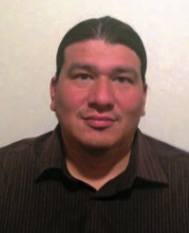 01/05/09 : January 5, 2009 GTC Annual Meeting & Report from OSGC
01/05/09 : January 5, 2009 GTC Annual Meeting & Report from OSGC
The five board members include:
William Cornelius, Chairman
Jennifer Hill-Kelley, Secretary / Treasurer
Brenda Mendolla-Buckley
Jim VanStippen
Mike MetoxenVision: OSGC will be a profitable company generating a base income from real estate development opportunities. These properties will be utilized for the development of business ventures that will generate greater levels of income.
Mission: To promote and enhance economic diversification as a holding company for real estate assets, management of related assets or as a holding company for other business ventures to develop long-term income streams for the Oneida Tribe.
Goals: …
• Report annualized profits to the Oneida Business Committee and General Tribal Council, if needed. …Strategies:
1. Analyze each business venture and determine its viability based on a standard of accounting principals and industry standards. [end of report]
 01/06/09 : January 6, 2009 Order for Withdrawal by Stellpflug Law as Counsel for Ron Van Den Heuvel, Brown Co. Case No. 08CV2265, Hilliard Limited Partnership v. Ron Van Den Heuvel & Evergreen Development, LLC
01/06/09 : January 6, 2009 Order for Withdrawal by Stellpflug Law as Counsel for Ron Van Den Heuvel, Brown Co. Case No. 08CV2265, Hilliard Limited Partnership v. Ron Van Den Heuvel & Evergreen Development, LLC
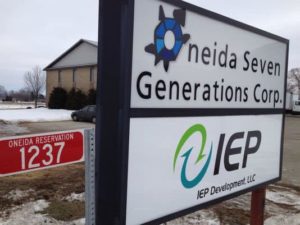 01/07/09 : OSGC-majority-shareholder company IEP Development, LLC registered w/WDFI; changed Registered Agent to Kevin I. Cornelius on 10/07/11; Administratively dissolved on 08/11/15
01/07/09 : OSGC-majority-shareholder company IEP Development, LLC registered w/WDFI; changed Registered Agent to Kevin I. Cornelius on 10/07/11; Administratively dissolved on 08/11/15
• IEP Development, LLC, is related to International Energy Partners [IEP ME] in Caribou, ME.
• See also CBEnergy.us.
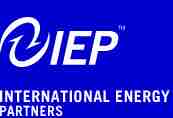
• MARC HESS worked for the original IEP in Maine, for IEP Development, LLC in Wisconsin, and for his own Wisconsin company, MH Resources, LLC.
• More info about OSGC & IEP Dvmt. below regarding the 11/09/09 Wisconsin Dept. of Commerce [WIDoC] $2Million Award Contract #LEG-FY10-19812 to OSGC for an ‘energy project.’
- January 7, 2009 Letter from Judge Bischel to Attys. Kirschling & Nova, Brown Co. Case No. 08CV2265, Hilliard Limited Partnership v. Ron Van Den Heuvel & Evergreen Development, LLC
 01/09/09 : January 9, 2009 Stipulation Permitting Stellpflug Law, S.C.’s Withdrawal as Attorneys for Ron Van Den Heuvel & Evergreen Development, LLC, Brown Co. Case No. 08CV2265, Hilliard Limited Partnership v. Ron Van Den Heuvel & Evergreen Development, LLC
01/09/09 : January 9, 2009 Stipulation Permitting Stellpflug Law, S.C.’s Withdrawal as Attorneys for Ron Van Den Heuvel & Evergreen Development, LLC, Brown Co. Case No. 08CV2265, Hilliard Limited Partnership v. Ron Van Den Heuvel & Evergreen Development, LLC
NOW COME the Defendants, Evergreen Development, LLC, and Ronald H. Van Den Heuvel (hereinafter collectively “Evergreen”), and Stellpflug Law, S.C., (hereinafter “Stellpflug”), who hereby stipulate that Stellpflug may withdraw as counsel for Evergreen in the above-entitled matter due to [Evergreen’s] failure to timely pay for services rendered by Stellpflug to date in this matter on its behalf.

 02/11/09 : According to the September 20, 2016 Superseding Indictment, Docket No. 16-CR-064, USA v. Ron Van Den Heuvel, Kelly Van Den Heuvel & Paul Piikkila:
02/11/09 : According to the September 20, 2016 Superseding Indictment, Docket No. 16-CR-064, USA v. Ron Van Den Heuvel, Kelly Van Den Heuvel & Paul Piikkila:
6. On or about February 11, 2009, Piikkila authorized a loan of $30,000 to straw borrower [Steven Peters, partner in Nature’s Way Tissue Corp.]. Those funds were promptly used for the benefit of two of Ronald Van Den Heuvel’s business entities.

![]() 02/12/09 : FILED – Summons & Complaint, Brown Co. Case No. 09CV439, Glory LLC v. Ron Van Den Heuvel & Tissue Technology LLC [and dismissed defendants: Partners Concepts Development Inc; Custom Paper Products Inc; Natures Choice Tissue LLC; Purely Cotton Products Corp; Eco Fibre Inc; ReBox Packaging Inc; Tissue Products Technology Corp; Patriot Project Services LLC; Chat LLC; Patriot Investments LLC; Patriot Services Inc; RVDH Inc; Waste Fiber Technology Inc; Recovering Aqua Resources Inc; RV Jet Inc; KYHKJG LLC; Patriot Paper Services Inc; Fibre Solutions LLC; Doc-U-Mince LLC; and dismissed third-party defendants: Ross J. Nova; Godfrey & Kahn.]
02/12/09 : FILED – Summons & Complaint, Brown Co. Case No. 09CV439, Glory LLC v. Ron Van Den Heuvel & Tissue Technology LLC [and dismissed defendants: Partners Concepts Development Inc; Custom Paper Products Inc; Natures Choice Tissue LLC; Purely Cotton Products Corp; Eco Fibre Inc; ReBox Packaging Inc; Tissue Products Technology Corp; Patriot Project Services LLC; Chat LLC; Patriot Investments LLC; Patriot Services Inc; RVDH Inc; Waste Fiber Technology Inc; Recovering Aqua Resources Inc; RV Jet Inc; KYHKJG LLC; Patriot Paper Services Inc; Fibre Solutions LLC; Doc-U-Mince LLC; and dismissed third-party defendants: Ross J. Nova; Godfrey & Kahn.]
• $1,227,880.01 MONEY JUDGMENT for Glory, LLC against Tissue Technology, LLC on 09/05/13
 February 12, 2009 Letter from Atty. Ross Nova [of Godfrey & Kahn for Hilliard LP] to Judge Bischel, Brown Co. Case 08CV2265, Hilliard Limited Partnership v. Ron Van Den Heuvel & Evergreen Development, LLC
February 12, 2009 Letter from Atty. Ross Nova [of Godfrey & Kahn for Hilliard LP] to Judge Bischel, Brown Co. Case 08CV2265, Hilliard Limited Partnership v. Ron Van Den Heuvel & Evergreen Development, LLC
 02/16/09 : February 16, 2009 Letter from Judge Bischel to Ron Van Den Heuvel, Brown Co. Case 08CV2265, Hilliard Limited Partnership v. Ron Van Den Heuvel & Evergreen Development, LLC
02/16/09 : February 16, 2009 Letter from Judge Bischel to Ron Van Den Heuvel, Brown Co. Case 08CV2265, Hilliard Limited Partnership v. Ron Van Den Heuvel & Evergreen Development, LLC
 02/25/09 : February 25, 2009 Letter from Ron Van Den Heuvel to Judge Bischel, Brown Co. Case 08CV2265, Hilliard Limited Partnership v. Ron Van Den Heuvel & Evergreen Development, LLC
02/25/09 : February 25, 2009 Letter from Ron Van Den Heuvel to Judge Bischel, Brown Co. Case 08CV2265, Hilliard Limited Partnership v. Ron Van Den Heuvel & Evergreen Development, LLC
03/13/09 : Source of Savings, Inc. Administratively Dissolved w/ WDFI; Principal Office 2079-A Lawrence Dr., De Pere, WI; Started on 03/11/03; Registered Agent Pedro ‘Pete’ Fernandez, husband of Kim Yessman, who is the sister of Ron Van Den Heuvel’s wife, Kelly Lea Yessman.
03/16/09 : VHC Arkansas, LLC, administratively Dissolved w/ WDFI; Registered Agent to Ron’s brother David Van Den Heuvel; Started as R&K Arkansas, LLC on 03/21/97, renamed PCDI Arkansas, LLC on 08/27/98, and VHC Arkansas, LLC on 12/11/98
 03/19/09 : March 19, 2009 Affidavit of Atty. Ross Nova [G&K for Hilliard LP] w/ Exhibits, Brown Co. Case No. 08CV2265, Hilliard Limited Partnership v. Ron Van Den Heuvel & Evergreen Development, LLC
03/19/09 : March 19, 2009 Affidavit of Atty. Ross Nova [G&K for Hilliard LP] w/ Exhibits, Brown Co. Case No. 08CV2265, Hilliard Limited Partnership v. Ron Van Den Heuvel & Evergreen Development, LLC
- March 19, 2009 Letter from Ron Van Den Heuvel to Judge Sue E. Bischel, Circuit Court Branch III, Brown Co. Case No. 08CV2265, Hilliard Limited Partnership v. Ron Van Den Heuvel & Evergreen Development, LLC
Re: … Lawyer/Client – Privileged Information, confidentiality and conflict of interest
Dear Judge Bischel:
The following statements are true and complete and should warrant immediate attention.
1 . Godfrey and Kahn has a clearly [sic] understanding that Tak Investments, ST Paper, LLC and ST Holdings, LLC are technology and business partners with Tissue Technology, LLC [TTL] and that Ron Van Den Heuvel is an 83% owner of TTL.
2 . Without Mr. Van Den Heuvel or Tissue Technology, LLC having legal counsel present Godfrey and Kahn’s attorneys have met with Mr. Van Den Heuvel, Mr. Sharad Tak, owner of Tak Investments and ST companies, and the various companies on many occasions. Mr. Van Den Heuvel and Mr. Sharad Tak have understood any items stated or discussed in these meetings were covered as privileged information and under the client/lawyer confidentiality.
3 . Godfrey and Kahn clearly understands that ST Paper and Tak [Investments, LLC] shared the same office at 1555 Glory Road, Green Bay, WI 54304 with Tissue Technology. Godfrey knows this as they sent TTL notices and Tak/ST Paper invoices to that location.
4. Godfrey and Kahn clearly understand that they have drafted joint agreements for both ST Paper group and Ron Van Den Heuvel and Tissue Technology, LLC group.
5. Funds of Tissue Technology group and of Ron Van Den Heuvel have been used to pay fees of Tak Investment or ST Group due and owed to Godfrey and Kahn.
6. Godfrey and Kahn has directly requested and received numerous documents, letters and emails as well as other confidential information from Ron Van Den Heuvel (personally), Partners Concepts Development, Inc., Ecofibre, Inc., Tissue Products Technology Corp., Tissue Technology, LLC and Oconto Falls Tissue, Inc.

03/31/09 : Alliance Construction and Design LLC registered w/ WDFI; Renamed Alliance GC [for ‘Global Conservation’ ], LLC on 07/16/09; Changes of Registered Agent on 11/15/10, and 05/05/11, and 04/10/12, and 03/25/15
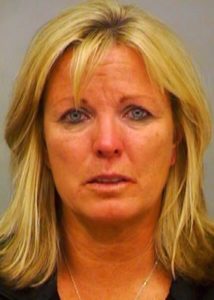
04/02/09 : FILED Brown Co. Case No. 2009CV980, Manchester Mortgage Co. LLC v. Ronald H. Van Den Heuvel, Kelly Y. Van Den Heuvel, George Washington Service Bank, Christopher J. Hartwig, John R. Petitjean, Mau & Assocates LLP, Anchorbank FSB, Hughes Socol Piers Resnick & Dym Ltd, IFC Credit Corp., Industrial Technology Ventures LP, State of Wisconsin, Jan Marie Summers Van Den Heuvel, VHC Inc.;
• 2013 MONEY JUDGMENT against Ron Van Den Heuvel for $3,751,642.32 and a second judgment against Ron Van Den Heuvel for $2,567,396.98
 According to the May 8, 2015 10:00 a.m. to 12:59 p.m Supplemental Examination of Ronald H. Van Den Heuvel Before James O’Neil, Court Commissioner by Atty. Jonathan Smies of Godfrey & Kahn on behalf of Plaintiff Dr. Marco Araujo; Defendant Ron Van Den Heuvel represented by Atty. John Petitjean of Hinkfuss, Sickel, Petitjean & Wieting
According to the May 8, 2015 10:00 a.m. to 12:59 p.m Supplemental Examination of Ronald H. Van Den Heuvel Before James O’Neil, Court Commissioner by Atty. Jonathan Smies of Godfrey & Kahn on behalf of Plaintiff Dr. Marco Araujo; Defendant Ron Van Den Heuvel represented by Atty. John Petitjean of Hinkfuss, Sickel, Petitjean & Wieting
Starting on page 36:
[Godfrey & Kahn:] You live in a house; is that correct?
[Ron Van Den Heuvel:] Yes.
[G&K:] And at one time you did own that house, didn’t you?
[RVDH:] Yes.
[G&K:] And now it is the case that Manchester Mortgage [Company], LLC [Link 1], owns the property.
[RVDH:] Correct.
[G&K:] And do you pay rent then to Manchester Mortgage Company, LLC [Link 2]?
[RVDH:] No.
[G&K:] Do you have any kind of agreement with Manchester Mortgage Company, LLC, concerning your ability to live in the residence?
[RVDH:] I have a handshake.
[G&K:] What’s the nature of this handshake, as you call it?
[RVDH:] He holds three million shares in E.A.R.T.H., and as long as I’m working for the betterment of E.A.R.T.H., I stay in the property. If the shares ever go over $6 apiece, he gives me my house title back.
[G&K:] Who is he? Who are you referring to?
[RVDH:] Manchester Mortgage. Jim George is the president of it.
[G&K:] Does Mr. George then – Is it Manchester Mortgage Company, LLC, that has an interest in E.A.R.T.H. or Jim George?
[RVDH:] Manchester Mortgage. They bought the note from Citizens [Bank].
[G&K:] And your agreement with Mr. George, was this reduced to writing?
[RVDH:] No.
[G&K:] When did you come to this agreement?
[RVDH:] After.
[G&K:] So after Manchester Mortgage Company, LLC, obtained – presumably foreclosed on the house, bid at the sale –
[RVDH:] There were $65 million of debt against it.
[G&K:] There were $65 million of debt against your residence?
[RVDH:] Yes.
[G&K:] And Manchester Mortgage was the senior lender, senior secured lender?
[RVHD:] It bought the loan from Citizens Bank, foreclosed on the first, and everybody went off the back.
[G&K:] And after they obtained the property through the process and the courts, they then had an agreement with you, just a verbal – an oral agreement essentially that you would stay there rent free as long as – Can you explain what as long as – As long as what, I guess.
[RVDH:] I cut the lawn, remove the snow, keep the repairs up, pay the heating and lighting bills.
[G&K:] So you’re responsible to pay the utilities for the property. Are you responsible to pay the property taxes?
[RVDH:] Yes.
[G&K:] Have you paid any property taxes since the Manchester Mortgage Company took ownership of the property?
[RVDH:] Yes, twice.
[G&K:] And what years was that?
[RVDH:] ’11 and ’12. And I personally didn’t pay them.
[G&K:] Who paid them?
[RVDH:] Someone else. I don’t remember which person paid them each year.
[G&K:] Do you have a sense of how much – You did pay them for a number of years when you owned the house, right?
[RVDH:] Right.
[G&K:] And do you have a sense as to how much they were then at least?
[RVDH:] $48,000 a year.
[G&K:] But as you sit here today, you can’t remember who was willing to pay property taxes for 2011 and 2012 for the property you’re living in?
[RVDH:] No. I mean, I can go find out.
[G&K:] Do you think it was a family member or friend?
[RVDH:] Probably somebody that owed me money.
[G&K:] Was there any agreement written to reflect that payment on your behalf?
[RVDH:] No.
[G&K:] So –
[Atty. Petitjean:] Other than a tax receipt?
[RVDH:] I got a receipt from the courthouse.
[G&K:] So your understanding of this oral agreement you have with – between you and Manchester Mortgage Company, LLC, is that you are to maintain the property, cut the grass, plow the driveway, pay the utilities, pay the property taxes. And what else? Anything else that relates to the property?
[RVDH:] Nothing else to the property.
[G&K:] And were there any conditions concerning your role at E.A.R.T.H. and your ability to stay in the residence?
[RVDH:] No. At my dad’s funeral we talked about it a long time again and perfectly comfortable. He sees the share value going up. It’s on the board.
[G&K:] So if the shares –
[RVDH:] Hit $6 a share, I get the title back to the house.
[G&K:] Presumably, that would allow Manchester to liquidate their shares and/or do whatever they want. That’s their decision, I guess.
[RVDH:] It’s their shares.
[G&K:] How are those shares valued, if you know?
[RVDH:] Outside firms.
[G&K:] When was the last time you had an outside firm prepare a valuation of E.A.R.T.H.?
[RVDH:] Six months ago.
[G&K:] And what was the share price valuation at that time?
[RVDH:] Three something, $3 and some cents.
[G&K:] And how many shares are outstanding or issued of E.A.R.T.H.?
[RVDH:] A hundred million.
[G&K:] I just want to know, how many shares do you own of E.A.R.T.H.?
[RVDH:] I personally don’t own any of E.A.R.T.H.
[G&K:] It’s all through –
[RVDH:] That’s correct.
[G&K:] It’s all through – I have to go back.
[Ron Van Den Heuvel:] RVDH[, LLC] or PCDI. I personally don’t own any.
[G&K:] Indirectly through your ownership of those entities, what is your percentage of interest in E.A.R.T.H.?
[RVDH:] I wouldn’t be able to –
[G&K:] You have no sense as –
[RVDH:] No.
[G&K:] – you sit here today?
[Atty. Petitjean:] He’s already indicated he doesn’t own –
[G&K:] He doesn’t own directly, but he has an interest in entities that have a proportionate interest in –
[Atty. Petitjean:] And all those entities, he’s indicated, have numerous shareholders.
[RVDH:] It would be hard to figure out.
[G&K:] But it could be figured out. I mean, you –
[RVDH:] Schenck [S.C.] could do it.
[G&K:] But as you sit here, you don’t know if you have three or other entities. You don’t know if you have one percent or 80 percent of E.A.R.T.H.?
[Ron Van Den Heuvel:] I wouldn’t know. I mean, I know I have more than one percent, okay? But I couldn’t – I couldn’t venture a guess that would be worth putting under oath.
 04/03/09 : April 3, 2009 Defendant’s pro se Reply Brief to Plaintiff’s Motion for Summary Judgment, Brown Co. Case No. 08CV2265, Hilliard Limited Partnership v. Ron Van Den Heuvel & Evergreen Development, LLC
04/03/09 : April 3, 2009 Defendant’s pro se Reply Brief to Plaintiff’s Motion for Summary Judgment, Brown Co. Case No. 08CV2265, Hilliard Limited Partnership v. Ron Van Den Heuvel & Evergreen Development, LLC
 04/09/09 : FILED – Brown Co. Case No. 2009CV1050, Wisconsin Public Service Corporation v. Ronald H. Van Den Heuvel; Ann Murphy; Patrick Murphy; Chris J. Hartwig; Hilliard Limited Partnership; (Oneida Tribe-owned) Bay Bank; Eco Fibre Inc.; Baylake Bank; Fortress Credit Corp.; SHF XII LLC (Stonehill Financial LLC); Anchorbank FSB; Cordova Ventures; Industrial Technology Ventures LP; Yale Materials Handling Green Bay Inc.; Stockhausen Inc.; Sterling Industrial Sales LLC; Brian A. Everson; Hughes Socol Piers Resnick & Dym Ltd.; State of Wisconsin Dept. of Workforce Development; United States of America; Garnishees: Chase Bank; Spirit Construction Services Inc.; VOS Construction Services Inc.
04/09/09 : FILED – Brown Co. Case No. 2009CV1050, Wisconsin Public Service Corporation v. Ronald H. Van Den Heuvel; Ann Murphy; Patrick Murphy; Chris J. Hartwig; Hilliard Limited Partnership; (Oneida Tribe-owned) Bay Bank; Eco Fibre Inc.; Baylake Bank; Fortress Credit Corp.; SHF XII LLC (Stonehill Financial LLC); Anchorbank FSB; Cordova Ventures; Industrial Technology Ventures LP; Yale Materials Handling Green Bay Inc.; Stockhausen Inc.; Sterling Industrial Sales LLC; Brian A. Everson; Hughes Socol Piers Resnick & Dym Ltd.; State of Wisconsin Dept. of Workforce Development; United States of America; Garnishees: Chase Bank; Spirit Construction Services Inc.; VOS Construction Services Inc.
- 08/16/11 DEFAULT JUDGEMENT FOR MONEY:
• DEBTOR RON VAN DEN HEUVEL: $341,541.00
• DEBTOR ECO FIBRE, INC.: $368,734.49

04/10/09 : April 10, 2009 Letter from Atty. Ross Nova [G&K for Hilliard LP] to Judge Bischel, Brown Co. Case No. 08CV2265, Hilliard Limited Partnership v. Ron Van Den Heuvel & Evergreen Development, LLC
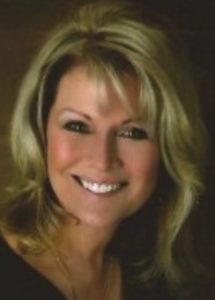 04/15/09 : Tak Investments, LLC filed Articles of Dissolution w/ WDFI; Started on 02/27/02
04/15/09 : Tak Investments, LLC filed Articles of Dissolution w/ WDFI; Started on 02/27/02
According to LinkedIn, Ron Van Den Heuvel’s sister – owner of Murphy Development, Inc. – Ann M. Murphy became a Consultant to Tak Investments, LLC, where her profile says that she:
Assists the owner [Sharad Tak] in decisions regarding investments.
04/16/09 : April 16, 2009 Decision of Judge Sue Bischel, Brown Co. Case No. 08CV2265, Hilliard Limited Partnership v. Ron Van Den Heuvel & Evergreen Development, LLC
ANALYSIS
It is difficult to precisely ascertain the nature of Mr. Van Den Heuvel’s defense. He appears to assert there is a material question of fact regarding another agreement between the parties. Mr. Van Den Heuvel appears to claim that there was an oral agreement between the parties that the plaintiff would not enfoce the note until some type of closing occurred regarding another business (Eco Fibre, Inc.). But this information is contained in Mr. Van Den Heuvel’s response brief. He has submitted no Affidavits or supporting documents in that regard.
It is a “well established principle” that parties against whom a properly supported motion for summary judgment is made may not rest upon mere allegations, but must, by affidavits or other statuatory means, set forth specific facts showing that there exists a genuine issue requiring a trial. … If the adverse party does not so respond, summary judgment, if appropriate, shall be entered against such party. … Thus, as the factual allegations are not properly supported, I must ignore them.
…I am satisfied that the complete failure to submit Affidavits or other supporting documents requires me to grant the Plaintiff’s Summary Judgment Motion.
CONCLUSION
For the foregoing reasons, the Plaintiffs’ Motion for Summary Judgment against defendant, Ronald Van Den Heuvel, is hereby granted.
- April 16, 2009 Letter from Judge Bischel to Atty. Nova & Mr. Van Den Heuvel re: Decision & Order, Brown Co. Case No. 08CV2265, Hilliard Limited Partnership v. Ron Van Den Heuvel & Evergreen Development, LLC
04/23/09 : April 23, 2009 Order for Judgment and Judgment by Judge Sue E. Bischel, Brown Co. Case No. 08CV2265, Hilliard Limited Partnership v. Ron Van Den Heuvel & Evergreen Development, LLC
 05/11/09 : May 11, 2009 Letter from Godfrey & Kahn to Brown Co. Clerk of Courts, Brown Co. Case No. 08CV2265, Hilliard Limited Partnership v. Ron Van Den Heuvel & Evergreen Development, LLC
05/11/09 : May 11, 2009 Letter from Godfrey & Kahn to Brown Co. Clerk of Courts, Brown Co. Case No. 08CV2265, Hilliard Limited Partnership v. Ron Van Den Heuvel & Evergreen Development, LLC
Enclosed please find twenty-five (25) original Garnishment Summons and Complaints for Non-Earnings against Ronald Van Den Heuvel, along with four copies of each Garnishment, in the above referenced matter.
SPRING 2009 : According to 5280 Magazine [Denver, COLORADO]
‘The Biggest
in America’
by James Carlson
Denver’s Wayde McKelvy raised tens of millions of dollars for a new, clean-energy company that the SEC says was nothing more than an old-school Ponzi scheme
re: MANTRIA CORP. / ETERNAGREEN GLOBAL CORP. / BIOCHAR / PYROLYSIS PONZI SCHEME that was PRAISED BY BILL & HILLARY CLINTON and AL GORE
The spring day had been a warm one, but as Taylor Romero walked from his Centennial office across the parking lot to the Embassy Suites, the sun was setting and the air chilled. His employer, Wayde McKelvy, had been holed up in a room at the hotel for days. Romero knew this likely meant one thing—well, two things: booze and hookers. For as long as Romero had known McKelvy the guy exhibited hedonistic, self-destructive tendencies. Lately, though, he’d been on a Charlie Sheen–like tear. The 46-year-old McKelvy had taken to showing up at work drunk, holding the waist of whichever working girl he’d flown in. He was so blatant that even his wife, the mother of their twin girls, knew about it all. By then, late spring 2009, Donna McKelvy had grown accustomed to her husband and his prostitutes. What she could not abide, however, was the whore du jour banging up the Mercedes-Benz. She’d asked Romero to go to the Embassy and get the keys.
Romero took the elevator up and knocked. The way he remembered it, the door opened, and there, standing on a floor littered with empty Bud Light bottles, was McKelvy. The two men were not merely colleagues, they were friends. They plopped onto a couch, McKelvy dropping his 6-foot-4-inch, 250-pound frame. Romero learned the keys to the Benz were gone. And sure enough, so was the girl. While Romero stuck around, waiting, the two men discussed their dream of making a movie together. It would be dark and atmospheric; McKelvy already picked a tagline: What’s the Definition of Insanity?
Young with long dark hair, Romero is the kind of computer-programmer dude who wears flip-flops to work. He’d built a website for the Mantria Corporation, a new green company for which McKelvy was the lead investment broker and ultimately the sole money engine. This startup, as McKelvy had put it to anyone who’d listen, was a revolutionary investment opportunity. Mantria, so went the pitch to investors, was constructing the country’s first carbon-negative residential community, where energy-efficient housing would be built with sustainable materials, and the whole thing would be powered by alternative energy. As if that weren’t enough, Mantria was also supposedly on the verge of releasing an unprecedented technology that turned garbage into usable materials and produced something called biochar, a charcoal that when used as a fertilizer was carbon-negative. Operating from his hometown of Denver, McKelvy would raise close to $40 million from hundreds of investors, the majority of them from COLORADO.
After a while, a short Latina woman walked into the hotel room holding a bag of groceries and the car keys. Slurring, McKelvy yelled at Romero. Romero yelled back. Something about the family’s car and the prostitute. From a corner of the bottle-strewn room, the prostitute piped up: “Why are you talking about me like I’m not here!” She put down the keys, Romero grabbed them, and he split. Talk about the definition of insanity: “It was classic Wayde under pressure,” Romero says. “The bigger things get, the harder Wayde crashes.”
 The crash had only just begun. In November 2009, some six months after that night in the hotel, the Securities and Exchange Commission (SEC) filed a civil lawsuit against McKelvy and his wife, and against the Philadelphia-based owners of Mantria. As far as the SEC was concerned, McKelvy had fleeced his investors out of tens of millions of dollars in a big, green Ponzi scheme.
The crash had only just begun. In November 2009, some six months after that night in the hotel, the Securities and Exchange Commission (SEC) filed a civil lawsuit against McKelvy and his wife, and against the Philadelphia-based owners of Mantria. As far as the SEC was concerned, McKelvy had fleeced his investors out of tens of millions of dollars in a big, green Ponzi scheme.
Multimillion dollar white-collar scams are as American as apple pie. See, most recently, Bernie Madoff, who wormed his way into Wall Street and decimated the portfolios of thousands of investors to the tune of $17 billion. Sentenced to life in prison, Madoff has become the infamous face of financial-market malfeasance nationwide. Coloradans, meanwhile, witnessed their own high-profile grifter. Denver hedge fund manager Sean Mueller ripped off 65 people, including John Elway, for some $71 million. Last December, Mueller was sentenced to 40 years in prison. But whereas Madoff’s and Mueller’s frauds could have occurred anywhere, during almost any era, McKelvy and Mantria’s “business plan” was based on a uniquely contemporary premise, and one that has been especially appealing for Coloradans.
The United States shouldn’t be dependent on foreign oil; the country must create a workforce for the 21st century; the environment must be protected: These are a few of the reasons the federal government has been nudging industry toward green, or clean, energy. The national trend has dovetailed nicely with progressive thinking in Colorado, where conservation and sustainability are rooted in the mountain lifestyle. Former Governor Bill Ritter lured numerous clean-tech companies to Colorado, including the world’s largest wind turbine manufacturer, Vestas. He successfully championed a bill that required the state to produce 30 percent of its electricity from renewable energy, the largest proportion in the Western states.
COLORADO is so synonymous with green power that in February 2009, President Obama chose to announce his $787 billion economic-stimulus package—filled with “clean-energy” provisions—in Denver. The venue the president chose was the Denver Museum of Nature and Science, where the roof is home to a solar-panel field, which was installed by a Boulder-based company, Namasté Solar. Indeed, one would be hard-pressed to imagine a place more perfect than Denver to exemplify the confluence of environmentalism and capitalism (not to mention the venture capitalism of Boulder). Arguably, no one is more primed for green investment opportunities—or susceptible to clean-energy con men—than Coloradans. “If you can show me how to save the world,” as a Denver-area woman who was one of the first Mantria investors puts it, “sign me up.”
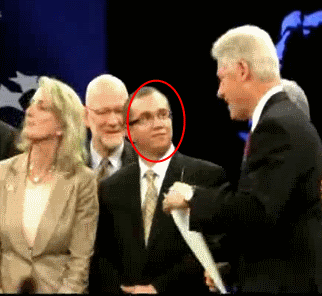
Bill Clinton recognizing Troy Wragg, found guilty by the SEC of running a Ponzi scheme in 2011 & pled guilty in 2017 to the Mantria Corporation waste energy Ponzi scheme
It was just after Obama’s Denver appearance that McKelvy and his Philly-based Mantria partner, CEO Troy Wragg, were telling investors that the company was engaged in promising meetings with the president of Ivory Coast; that Mantria was hobnobbing with the Clinton Global Initiative; and that the company was “this close” to selling $240 million worth of its “systems.” To develop their audacious projects Wragg and McKelvy needed cash. Mantria investors, according to the SEC, were offered securities in the form of “promissory notes, stock, limited partnership interests, and so-called profits interest.” These contracts promised extraordinary returns over periods as short as eight months.
The reality, according to the SEC, was that Mantria produced virtually no revenue in its two years of operation. The purported $240 million deal vanished. Mantria’s product sales amounted to unloading one bag of biochar. It went for $97. The facts, so say the feds, show that every dime investors received was funded by new investors—in other words, a classic Ponzi scheme. McKelvy was not an employee or corporate officer of Mantria, but he was a rainmaker, persuading investors to empty their retirement accounts for the promise of 17 to “infinite” percent returns.
Since 2008, securities officials have targeted at least five alleged scams involving clean energy, prompting the Financial Industry Regulatory Authority to release an investor alert stating, “It seems like everybody’s going green these days—even fraudsters.” And according to the state and federal paper trail, Mantria is the biggest green scam to date in the United States: Investors lost some $35 million, more than all of the other green scams combined. In the SEC complaint, McKelvy is akin to the Madoff of green—with a touch of Tony Robbins. And there may be another similarity between McKelvy and Madoff, and, for that matter, the local Mueller crook: McKelvy appears to be another financial fraud halted too late due to regulatory bureaucracy.
Troy Wragg, a working-class kid from Philly turned scrappy entrepreneur, created Mantria in 2005 while in his early 20s. His espoused dream was that Mantria would develop a carbon-negative residential utopia. Big dreams from a relative nobody like Wragg needed capital. For about two years, he was in business with BridgePoint Ventures LLC, a Florida-based real estate management firm. Sometime around 2007, however, BridgePoint ended its partnership with Mantria. “We had a pretty unceremonious parting of ways,” says Edward dePasquale, a BridgePoint vice president. The way dePasquale explains it, Wragg’s Mantria was over-appraising real estate, and BridgePoint decided “that we didn’t want to deal with him in any way, shape, or form.” Fortunately for Wragg, one of BridgePoint’s affiliates, Wayde McKelvy, who ran an LLC called Speed of Wealth, saw an opportunity in Mantria, and that same year the two began working together.
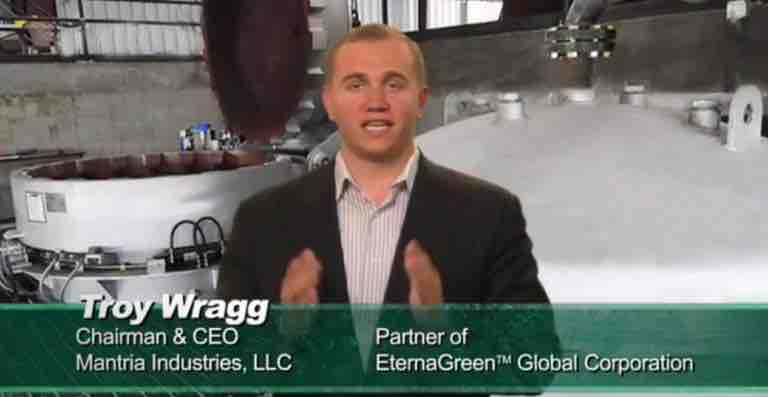
The men complemented each other quite well. Wragg was a fast-talking, youthful city slicker from the East Coast; McKelvy, twice the kid’s age, was a rugged, charismatic Coloradan. He attended South High School, then the University of Northern Colorado, where he played offensive lineman on the football team and majored in business. According to three of McKelvy’s former UNC teammates, he was the champion of the freshman beer “chug-a-lug” contest; he had a “screw loose”; and he wasn’t above eating a handful of worms to get a laugh. Former teammate Don Barlass remembers that McKelvy “definitely enjoyed school, enjoyed football, and enjoyed life. If Wayde was around, you knew you’d be having fun.” None of McKelvy’s old pals would have pegged him as a guy to scam anyone. On Team Mantria, Wragg rattled off numbers and stats, whereas McKelvy talked about big-picture-type stuff, in rousing and sometimes blunt everyman language.
On calls with potential investors in spring 2008, the personalities of the new partnership clearly had found their rhetorical groove. The two men were soliciting funds for Mantria Financial LLC, set up ostensibly to finance purchases in the carbon-negative utopia. According to the pitch, this community, Legacy Ridge, in Dunlap, Tennessee, had everything. Ten miles of streams, 12 miles of bluff lines, a five-star restaurant, and two designer golf courses—all being built with sustainable materials and powered by alternative energy. Any investment, Wragg laid out, would earn 17 percent annually for the next two-and-a-half years, and then an additional half-percent equity stake in the company’s projected profits ($70 million) after another two-and-a-half years. The possibilities were astronomical. A $250,000 buy-in would bear a $456,250 profit.
Enter McKelvy: “What Troy and I know,” he said in his folksy Colorado baritone, “is that if we make you happy with your returns—and that’s our number one priority, by the way—that you will always invest with us and we will have an ongoing business.” No one on that call questioned McKelvy’s compensation package. He was pulling 12.5 percent off the top of every investment he brought in, which is a rate of commission double that of what is typical for a well-compensated financial broker. And although the SEC requires broker-dealers be licensed, McKelvy, along with Wragg, was not.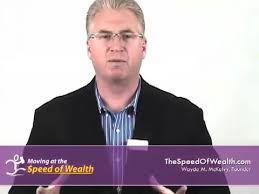
“For those of you waffling out there,” a caller on the teleconference said, “quit your waffling and get with the program. These guys know what they’re doing 110 percent.” Another caller added: “You can’t get a better education than from Wayde.”
In one of the calls, the former college football player sounded as if he were in a locker room at halftime, throwing down a gut-check challenge to his team: “A lot of things I hear out there. Number one: ‘It’s too good to be true.’ The first thing I say is, ‘Well then shouldn’t you jump in it right now?’ I’m sure you’ve heard that it’s too good to be true to get those kinds of returns in this market. Well folks, those of you who are invested with us know it’s not too good to be true. You get your checks. We keep coming out with better products.”
A stroll through The Venetian hotel and casino in Las Vegas is a walk of luxury. Marble pillars and gold-plated fixtures frame every hallway, painted murals adorn arched ceilings. Every turn seems to lead to the casino where you’re enticed to ooh and aah at the pretty possibilities; never mind the odds—bet big. It was here, at the Venetian, in December 2008, that Mantria investors gathered for what the partners described as a “big, end-of-year boot camp.”
They packed 100 to 200 strong into the ballroom, where projections of the Mantria logo—a large, oddly shaped M—were on every wall, looming over the audience. According to a handful of investors present for the gathering, McKelvy lurked in the back of the room while Wragg stood on stage in the spotlight. Mantria, he began, had undoubtedly delivered to investors unparalleled opportunities. None, however, were better than what he was about to present: What if you could help solve the climate crisis and eliminate the need for landfills? What would that look like for America? What about the world?
Well, after scouring the country, Wragg had discovered just such an opportunity. Mantria, he announced, was partnering with a company to develop technology that would produce biochar. What’s more, the technology would transform waste into usable products. It was a concept tailored for marketers. As Wragg repeated throughout his talk: “Trash into cash.” Romero, the computer programmer McKelvy had hired, noticed McKelvy standing at the back of Wragg’s presentation. To no one in particular, McKelvy repeatedly interjected his own version of the slogan he originally coined. “Sh¡t into cash,” he kept saying. “Sh¡t into cash.” Romero could tell that McKelvy was drunk.
After the presentation, audience members lined up to give video testimonials. “It’s been a mind-blowing experience,” one said. Another exclaimed, “I’m, like, having to take sleeping pills because I can’t sleep at night! Because I am so excited about what they’re talking about in our investment opportunities!”
Romero saw that McKelvy wasn’t as enthused. At dinner that first day, McKelvy appeared with a beer in hand, continuing to drink. Having seen his theatrics at Wragg’s speech, and now drinking into the late afternoon—Romero saw this as a possible sign of trouble. Romero was still in high school when a contact of his stepfather’s introduced him to McKelvy. It was the early 2000s, and McKelvy asked the kid to build a website for his wife’s insurance business. Romero jumped at the chance. Up to about 2003, he was paid well to develop the site. But then Romero watched McKelvy implode—drinking heavily and eventually filing for bankruptcy. Romero remembers McKelvy one day coming to him and saying, “Hey, we’re out of money.” Romero left for San Diego, where he remained until McKelvy wooed him back in 2008. Now, in Vegas, there was something in McKelvy’s demeanor; something of that old Wayde that Romero saw in the new Mantria Wayde.
Romero and other employees rode the strip of bright lights in stretch limos. At a VIP club, they were escorted past long lines into roped-off areas where, as Romero puts it, “top-shelf liquor is flowing like the nearby waterfall. It. Was. Crazy.” To employees like Romero, the party seemed a deserved celebration of the past year’s work and the future’s infinite possibilities. “We were going to save the planet,” Romero says, “and we were having a blast doing it.”
McKelvy didn’t attend the party on the strip. By the last day of the three-day boot camp, he was gone. He didn’t even show for his planned presentations. Outwardly, he had plenty of reasons to party and stick around. He had millions of reasons. He was becoming rich off of the commissions. He was well on his way to making $6 million over two-and-a-half years.
Business at Mantria boomed in the new year, 2009. The company was supposedly working on deals with New York and Colorado; the governments of Congo, West Africa, Liberia, Nigeria, and Ivory Coast; and with corporations like Cowboy Charcoal and John Deere. After standing on stage with Bill and Hillary Clinton in New York that year, Wragg employed what may have been stunningly transparent phrasing when he told investors, “It only adds another aura of credibility to what we’re doing.” McKelvy had already raised another $27 million.
Experts say Mantria’s technology could have achieved something similar to what was reported. But only with years of further tweaking. Hugh McLaughlin, the director of biocarbon research for Alterna BioCarbon in British Columbia, recalls witnessing Wragg tell a renewable energy conference that Mantria’s technology could generate biochar at a rate that would exceed scientific limits. Mantria’s promise, simply put, ridiculously outpaced reality. “Every fact about this thing,” McLaughlin says, “was exaggerated beyond any reasonable technical standards.” Yet only a few weeks after Vegas, during a January webinar with investors, McKelvy and Wragg projected a 53 percent annual return on a buy-in to the carbon-diversion systems.
Whatever melancholy – or was it pangs of conscience? – McKelvy might have been feeling in Vegas, was gone. Never mind the odds—bet big, was essentially what he told his investors: “I want you to go to your [401(k)] administrator tomorrow and ask them what it would take for you to roll out all your money. Don’t worry about anything they tell you. They’re going to try to frighten you. Don’t worry about that because [in] the mega-Webinar on February 10 I’m going to blow your mind.”
The mind-blower, investors learned on a teleconference, was that the U.S. Department of Agriculture was set to offer loan guarantees to Mantria, an FDIC-like endorsement backing investors’ money. A month later, in March 2009, Mantria announced a supposed letter of intent with the state of New York. But there were no deals with the Department of Agriculture and no letters of intent with any state governments.
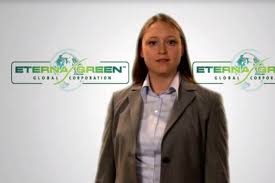
That was right about the time McKelvy started living life as if he were the star of a Girls Gone Wild video. A source familiar with the McKelvy family says, “As soon as this guy smells money, he gets ready for alcohol and a bacchanalian orgy.” He also seemed to be the unhappiest man on the planet. McKelvy told Romero that he was being asked to raise more money than his original goal. McKelvy wanted investors to get their money back and to be done with this. But, he told Romero, “I’m at the point of no return.”
During this period, McKelvy’s bank account seemed as bipolar as his moods. Between January and September 2009, the account showed nearly $3 million in deposits. That account’s balance at the end of September 2009 was just $1,325.98. As he once said to his investors, “Bottom line is: I love cash flow. I like lifestyle.” There were stays at the Bellagio in Las Vegas, the Beverly Wilshire, and other high-end hotels. One bill alone, for the Wynn Las Vegas Resort, totaled $9,628.22. The VIP treatment at clubs. A BMW. A $7,000-a-month oceanside condo in Miami. It wasn’t just him: Donna McKelvy was routinely making $20,000 withdrawals. Though it was Wayde who doled out the biggest bucks. In one three-day spree in Las Vegas, he spent nearly $25,000 on three pieces of Cartier jewelry, which, Donna has said, wasn’t for her.
McKelvy and Donna met in the late 1980s at a party in Denver, just after graduating college. The two married not long after and had twin girls. Donna went into the insurance business, while he launched a string of business flops.
By the time of the jewelry purchases in summer 2009, his and Donna’s marriage had disintegrated. McKelvy had moved to Miami full-time. There’s a good chance the jewelry was for McKelvy’s new girlfriend, a woman named Angela. Obviously years younger than McKelvy, the woman had platinum-blond hair, fake breasts, and a backside so pronounced that people close to him speculated it was enhanced with implants. McKelvy’s friends whispered that there was something about Angela that was…no one could seem to quite put their finger on it.
Meanwhile, on investor calls, every offering was better than the last, each a galactic chance at wealth—and possibly the final one. In a summer teleconference, what McKelvy called his “heart-to-heart,” he talked about how a new deal netting 55 to 100 percent annualized return was the “biggest, most generous offer we’ve ever made.… You guys are sitting there with Mantria on the cusp of greatness, in my belief,” he said softly, sounding on the verge of tears. “In my heart of hearts, I believe that. We’re on the cusp of greatness here.”
A few months later, in mid-September 2009, McKelvy told investors that Mantria had secured somewhere between $250 million and “over $1 billion” in financing, and it was the happiest day of his last five years. One caller was—at last—skeptical, and asked, “Is [the biochar technology] generating any revenues at this point?” Wragg skirted the issue, and when McKelvy jumped in, he finally admitted, “Right now our biochar sales are not explosive…but we do have a lot of orders.”
McKelvy implied that he’d heard similar concerns before, and that he was sick of it. “It’s time people get off the fence,” he said. “You know, I preach and preach and preach. I teach people strategies, but it always comes down to action. People say there are the haves and the have-nots in the world. That’s not true. It’s the wills and the will-nots. The people that do. And the people that do nothing.” It would be one of the last investor calls. A few weeks later, an October 7 letter from the SEC notified McKelvy that he and Mantria were under investigation.
“I probably shouldn’t talk to you,” McKelvy told me, “but that’s just who I am.” It was last February when he called, and since I’d left several messages for him and heard nothing, the call was unexpected. He sounded as if he were resigned to being the subject of the SEC lawsuit. He sounded almost as if he understood the reasons for it. And he seemed to shrug it off: “It’s the game I love,” he said. “I could care less about the money. My love is the game.” There’s evidence in McKelvy’s past that he views business as a game, and, to hear it from some of his former clients, he doesn’t play fair.
While Donna built a career in insurance and her husband opened that string of businesses, between 1995 and 2005, they owed the federal government more than $420,000. They were also named in a number of lawsuits. One lawsuit against McKelvy involved Conifer residents Cathy Reynolds and her husband Pat. Beginning in 2000, Cathy says, McKelvy called her numerous times out of the blue, claiming the company holding her mortgage was going out of business; she should stop sending payments. Not to worry, though; he was seeking a solution. McKelvy, as Cathy recalls, was direct but comforting. He played up his family, talking about his wife and daughters. According to Cathy’s 2002 suit filed in Jefferson County District Court, McKelvy told Cathy she “was just a number to the bank, not to call because they didn’t care about [her] and that he could help resolve her situation.”
Cathy says that if her home wasn’t going to be foreclosed on before McKelvy persuaded her to stop making payments, it certainly was after. Through a series of convoluted maneuverings—and what the Reynoldses say was a forged document—the mortgage was transferred numerous times. (At one point, it filtered through Jaguar Group LLC, whose head was himself recently convicted of a $3.4 million Ponzi scheme.) In the end, the Reynoldses and McKelvy agreed to disagree and the case was dismissed. Along the way, the couple filed for bankruptcy to halt their home’s public auction and reclaimed it by signing a mortgage double the amount of their original.
In researching their case, Cathy says, they came across other people who had been stung the same way. The suit may have been the first record of McKelvy being at the center of a muddled transaction that he initiated and from which he likely profited. “If he was covered in gas in front of me,” Pat Reynolds says, “I’d provide the match.”
By the mid-2000s, McKelvy had moved on to form an investment club called Retirement TRACS. It was at one of its meetings that Louisville, Colorado, resident Mary Phillips met McKelvy. Phillips is a self-assured woman with a Ph.D. in American studies. When she picks up a call, she answers, “This is Dr. Mary Phillips.” At the workshops she attended, McKelvy was a man of “simple American humor” and a bit brash. (He once yelled at a seminar, “What’s wrong with you folks? You expect change but you don’t change!”) Nonetheless, he struck her as a guy giving middle-class Coloradans a chance at investments usually reserved for the rich. Phillips and her husband lost a total of $500,000 to McKelvy and Mantria.
It’s tempting, perhaps, to characterize Mantria’s investors as unsophisticated suckers, but research says otherwise. Most are like Phillips: college-educated, higher-income, and more financially literate. With some investment knowledge, people tend to overestimate their ability to smell a raw deal, which researchers believe makes them vulnerable to scams. They also happen to be more prone to emotional pitches. Besides, Phillips points out that her husband went to Tennessee to see the Mantria-owned property, he saw the machine that made biochar, and even received a bag of the stuff. (Real in that it existed, but was nothing more than a facade.) As Phillips says when asked why she believed in sky-high returns, “Wouldn’t we all just like to catch a break, get something really good? It’s the American dream.”
At TRACS investment club meetings Phillips attended, McKelvy tapped into that desire. To play with the big boys, he preached liquidating all traditional funds and buying a universal life insurance policy, which, of course, he would sell. This plan acted as a sort of self-lending system, from which people could borrow at a relatively lower rate and invest in higher-return opportunities. What opportunities, exactly? Well, McKelvy had the scoop on some deals. On his advice, the club would roll $11.4 million into corporate bad debt and real estate in Mexico, the Dominican Republic, and even Granby, COLORADO. McKelvy would bring a deal to the club and say the returns were between 12 and 50 percent. Then he’d tilt his head back and crack a sly smile as if to say, Wait till you see what you really get. Running TRACS, McKelvy himself did well enough that Donna could leave her job in insurance. She came to work with him as his secretary. Meanwhile, to the club’s consternation, none of the investments panned out or paid out.
Of all McKelvy’s TRACS-proposed deals, none were as ludicrous as the $250,000 expenditure on a supposedly rare pink diamond. According to what McKelvy told his members, they could double their money over a year by purchasing the gem and flipping it to one of the potential buyers. He whetted the club’s appetite when he mentioned one particularly interested party: Jennifer Lopez. McKelvy told investors that TRACS purchased the diamond, but no members ever saw it, and it never sold. One investor refers to it as the “diamond boondoggle.” Nearly all of the $11 million invested under the auspices of McKelvy’s TRACS was never seen again.
In 2007, after he met Troy Wragg, McKelvy presented an incomparable invitation to his TRACS members: A chance to get in on the ground floor of a growing green company. This wasn’t just about wealth—it was about investing in the future of humanity. Incredibly, some of the club members followed McKelvy’s new advice. However, several other folks had seen enough, and filed complaints with the Colorado Division of Insurance. The SEC was brought in. (The SEC declined to comment on the record for this story.) McKelvy’s explanation comes by way of what he told his investors: “The SEC brought me forward in 2007 and dismissed it.”
A year later on May 30, 2008, the COLORADO Division of Insurance notified the COLORADO Division of Securities that a new complaint was filed against TRACS. At this point, McKelvy was devoted to raising money for Mantria. It wasn’t until January 30, 2009, that a state securities investigator, Jerry Lowe, asked the insurance division for the emails sent from McKelvy to the initial complainant.
In those emails, investigator Lowe read about green technology with the potential for gigantic returns. Five months after asking for the emails, the investigator attended two seminars. During one, Lowe listened as Wragg raised the prospect of “hundreds of percent rates of return.” That seminar occurred on May 21, 2009, almost a full year after the Division of Securities first received the complaint. The SEC, according to court testimony, wasn’t brought into the Mantria investigation until about five months later in “late September, early October of 2009.”
Miles Gersh, a local securities lawyer, says the SEC is efficient after charges have been filed. But “as far as [the SEC’s] ability to stop wrongdoing before the fact, though, they are a bit like traffic officers: many intersections, relatively few cops.” Regulators at all levels tend to be zealous guardians of their work product, Gersh says, which is a polite way of saying all of the state and federal investigative bodies are territorial and each wants to make the bust. Competency isn’t the problem, he says, it’s “unwarranted, counterproductive secrecy.”
“The primary reason” the SEC is tapped to help, says COLORADO securities commissioner Fred Joseph, “is when multiple states are involved.” The Mantria case certainly fit the bill. The company was registered in Delaware, based in Philadelphia, selling projects in Tennessee, and raising funds out of COLORADO. Yet it’s reasonable to conclude that if the state securities division had bothered to scratch the surface of Mantria, it would have brought in the SEC sooner.
When the SEC did initiate an investigation in fall 2009, it acted quickly. Within a month and a half, it filed its lawsuit and froze the assets of Mantria, Wragg, McKelvy, Speed of Wealth, Donna, and Wragg’s partner, an Amanda Knorr. For every Mantria investor, it was too late. By that time, investors had poured in more than $54 million.
On November 16, 2009, the news broke of the SEC’s filing against McKelvy and company. The news release said representations by McKelvy and Wragg were “laced with bogus claims.” At that point, as McKelvy himself has said, “I sat down and started reinventing myself at that moment.” Wayde McKelvy soon re-emerged as Clint Brashman, now apparently up to some of the same old business—and with a pornographic twist.
In the wake of the SEC’s filing, numerous websites popped up exhorting Americans to rid themselves of traditional investments, and were registered to a man named Clint Brashman. A search for that name brings up multiple videos offering marketing advice. One was posted on June 5, 2010, by “thebrashman,” and opens with a guy speaking directly into a camera. He’s thinner now and has grown a goatee, but there’s no mistaking it: It’s McKelvy.
“The Brashman” hasn’t restricted his pursuits to marketing and financial sites: He’s tied to a porn site as well. The Brashman’s email is listed as the administrative contact for a pornographic blog, where on the first page viewers see another familiar face, this one framed with platinum-blond hair dropping past fake breasts. It’s Angela. On the website she reveals she is a transsexual. She writes on her blog that her boyfriend “lost all his money” at the beginning of 2010 and “drinks too much.” Nonetheless, he’s done a lot for her, and she loves him still. They’ve been together in Miami for two years.
Initially, McKelvy told me he has nothing to do with that blog or an accompanying site that recruits other transsexual folks to produce pornography. He denied this even though the recruiting site is registered to his old business, Retirement TRACS Seminars. Confronted with these connections, McKelvy then said he’s made no money from his pursuits as Clint Brashman. “Why should I legally make any—that’s going to come out wrong—why should I make any income? What good does it do for me to make any money? The [SEC] is just going to take it.”
Speaking in the slight drawl that fed his image of a good-hearted Coloradan, McKelvy said that he may have done some things wrong. As far as Mantria, he admitted to the definition of a Ponzi scheme while bafflingly denying it was a Ponzi scheme: “I don’t care what the lawyers at SEC tell you; when you invest in mortgage-backed securities, they take money and go loan it to John Doe to buy a house. Doe makes payments and it flows back to me.… What I’m trying to say is that new money is always replacing old money in any investment.”
He rambled during the conversation, one minute saying those who lost money are the true victims; a minute later he lamented his crumbling reputation and compared those upset about losing their savings to homeowners complaining about their subprime mortgages. They could have asked questions, he said, done their own due diligence. “Not to sound like an asshole, I think it’s time Americans start taking some responsibility. I get that from my ex-wife now. Everything bad in her life is my fault.”
A few days after our phone conversation last February, McKelvy signed an agreement with the SEC in which he neither admitted nor denied the SEC’s allegations. However, according to the Order of Permanent Injunction, McKelvy “will be precluded from arguing that he did not violate the federal securities laws as alleged,” and furthermore, will not “take any action or to make or permit to be made any public statement denying, directly or indirectly, any allegation in the Complaint or creating the impression that the Complaint is without factual basis.”
According to the SEC resolution, fines still could, and likely would, be levied against him on behalf of Mantria’s investors. And this SEC settlement agreement does not preclude the possibility of related civil actions, or, say, criminal charges that might come from the FBI. (Wragg, Knorr, and McKelvy’s ex-wife, Donna, signed similar orders.)
To date, no criminal charges have been filed against anyone involved [UPDATE: SEE 09/02/15 UNSEALED INDICTMENT BELOW] with Mantria, but a couple of investors have been contacted by the FBI. Agents want to know what claims investors heard, what they were promised, and how much they lost. It’s unclear whether agents know about a guy named Clint Brashman.
“All of us have our own life lies that we tell ourselves,” Mantria investor Dr. Mary Phillips said about McKelvy. “Who we are, what we stand for. For Wayde, he wanted to be the ringmaster. He wanted to sway public opinion. Maybe he was lying to himself about what he was doing.”
• UNSEALED: September 2, 2015 U.S. Dept. of Justice Indictment against Three Principals of the Mantria Corporation Biochar & Pyrolysis Ponzi Scheme, U.S. District Court for the Eastern District of Pennsylvania, Case No. 2:15-cr-398-JHS United States of America v. Troy Wragg, Amanda Knorr & Wayde McKelvy
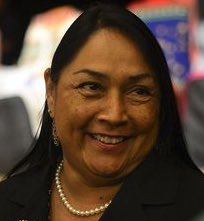 05/13/09 : ALL NATIONS ENERGY ALLIANCE, LLC registered w/ WDFI; Registered Agent Mark Anthony Sweet; Principal Office: 2994 E. Service Road, Oneida, WI, 54155
05/13/09 : ALL NATIONS ENERGY ALLIANCE, LLC registered w/ WDFI; Registered Agent Mark Anthony Sweet; Principal Office: 2994 E. Service Road, Oneida, WI, 54155
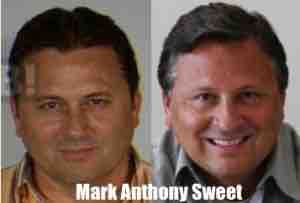
THE EXACT SAME ADDRESS AS FORMER OBC TREASURER & CHAIR CRISTINA DANFORTH’s BUSINESS – WHITE EAGLE BAR & GRILL:
MARK ANTHONY SWEET is also the Manager of ALL NATIONS DEVELOPMENT ALLIANCE, LLC registered w/ Minnesota Secretary of State on 04/04/10: Manager: Mark Anthony Sweet; Registered Office: 7241 Ohms Ln. #275, Edina, MN 55439; Principal Office: 350 N. Main Street, Suite 236, Stillwater, MN, 55082.
On 05/17/10 White Eagle II, LLC was Registered w/ WDFI, and renamed All Stars Pub & Grill, LLC on 04/03/12.
White Eagle Sports Bar & Grill was temporarily renamed All Stars Pub & Grill, and has reverted back to the name White Eagle Sports Bar & Grill.
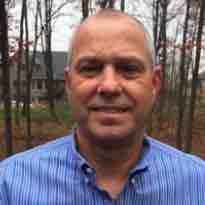
Steven C. Peters
05/15/09 : According to the September 20, 2016 Superseding Indictment, Docket No. 16-CR-064, USA v. Ron Van Den Heuvel, Kelly Van Den Heuvel & Paul Piikkila:
7. On or about May 15, 2009, Piikkila authorized a loan of $129,958 to straw borrower [Steven Peters, a Partner with Ron, Artley Skenandore Jr., and OSGC in Nature’s Way Tissue Corp.]. This loan consolidated the debts due on the [Feb. 11 and Sept. 12, 2009] loans noted…above. …
9. On or about May 15, 2009, Piikkila authorized a loan of $250,000 to straw borrower [Julie Gumban], an employee of Ronald and Kelly Van Den Heuvel. These funds were promptly paid to RVDH, Inc. and KYHKJG, LLC; paid to [Steven Peters] as payment for the loan noted in paragraph 7 above; or paid to [William C. Bain] to be used as payment on the loans noted in paragraph 5 above.
According to the July 1, 2016 Paul Piikkila Plea Agreement in U.S. District Court, Eastern District of Wisconsin Case No. 16-CR-64, United States of America v. Paul J. Piikkila:
On the same date, May 15, 2009, Piikkila approved a loan of $25,000 to [Julie Gumban] … a nanny for Ron and Kelly’s children. She comes from the Philippines and does not speak English well. The money borrowed in her name was immediately distributed to make a payment on the [Steve Peters] loan, make a payment on the [Bill Bain] loan, and to transfer money to Ron’s company, RVDH, and Kelly’s company, KYHKJG. [Julie Gumban] states that she was pressed to take out this loan by Ron and Kelly for whom she worked. It was her vague understanding that this money could be used by her to invest in Kelly’s company, but none of the money was used for that purpose. [Julie Gumban] states that Kelly brought her to Ron’s office to sign the loan papers with Piikkila. …
Kelly Lea Yessman Van Den Heuvel – Ronald’s wife & Co-Conspirator
Other apparent misleading information provided by Ron to [Paul] Piikkila and put into [Horicon Bank]’s records included grossly inflated financial statements. [Julie Gumban] had come to this country and had been working as a nanny for Kelly and Ron. Her financial statement claimed that she had assets of nearly $280,000, including $208,000 in real estate. It claimed that she had salaries and bonuses totalling $65,000 a year. However, she states that Ron and Kelly were not really paying her and were months behind in her salary. …
Kelly Van Den Heuvel culpably participated in the scheme, especially as to the loans to KYHKJG and [Julie Gumban]. Of course, she shared Ron’s motive for acquiring money to maintain their lifestyle.
As for the [Julie Gumban] loan, it seems that Kelly [Van Den Heuvel] was primarily responsible for that one. [Julie Gumban] states that Kelly is the person who physically brought her into Ron’s office to close that loan with Piikkila. Kelly told Piikkila that [Julie Gumban] was paid $50,000 a year but [Julie Gumban] says she was not being paid and, in fact, Kelly was running up debts on [Julie Gumban’s] credit cards. Prior to the issuance of the loan, Piikkila was communicating by email with Kelly about how the money was going to be disbursed. As noted above, none of it was disbursed for the benefit of [Julie Gumban.]
The purposes of the [Julie Gumban] loan were misrepresented in the bank’s records. [Julie Gumban] was supposedly to invest in KYHKJG [LLC] but none of the money was used for that purpose.
[Julie Gumban] agrees that Kelly asked her to take out the loan to invest in KYHKJG. [Julie Gumban] agrees that her financial statement was false and she did not know where the money went.
 05/19/09 : Nature’s Way Tissue Corp. changed Registered Agent w/ WDFI
05/19/09 : Nature’s Way Tissue Corp. changed Registered Agent w/ WDFI
- Tissue Technology, LLC restored to Good Standing w/ WDFI; Changed Registered Agent
- According to Advisory Notes provided to Oneida Eye by fmr. OBC Chair Ed Delgado‘s ‘Elder Advisor’ Yvonne Metivier:
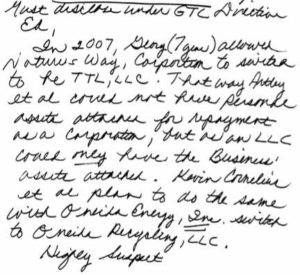
Oneida Energy, Inc. (BIA can get $ back)
Oneida Recycling, LLC (BIA cannot get $) …4. Investors and Shareholders
(who will have oversite?)
Must disclose under GTC DirectiveEd,
In 2007, Glory [LLC / OSGC] allowed Nature’s Way [Tissue] Corporation to switch to be TTL, LLC. That way Artley [Skenandore Jr.] et al [i.e. Ron Van Den Heuvel & Steven Peters] could not have personal assets attached for repayment as a corporation, but as an LLC could only have the business’ assets attached. [OSGC CEO] Kevin Cornelius et al plan to do the same with Oneida Energy, Inc. switch to Oneida Recycling [Solutions], LLC.
Highly Suspect
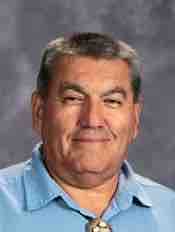
 Purely Cotton Products Corp. changed Registered Agent w/ WDFI to Artley Skenandore Jr., and changed on 02/25/16 to Ron Van Den Heuvel
Purely Cotton Products Corp. changed Registered Agent w/ WDFI to Artley Skenandore Jr., and changed on 02/25/16 to Ron Van Den Heuvel
 05/20/09 : Tissue Products Technology Corp. changed Registered Agent w/ WDFI
05/20/09 : Tissue Products Technology Corp. changed Registered Agent w/ WDFI
05/21/09 : Partners Concepts Development, Inc. changed Registered Agent w/ WDFI, and again on 06/29/15 to Ronald H. Van Den Heuvel
- Oconto Falls Tissue, Inc. restored to Good Standing and Changed Registered Agent w/ WDFI, and again on 04/10/12, and on 11/11/14 to Ronald H. Van Den Heuvel; Started as PCDI Oconto Falls Tissue, Inc. on 06/25/97
- Recovering Aqua Resources, Inc. restored to Good Standing w/ WDFI and Changed Registered Agent to Ron Van Den Heuvel; Dissolved 06/12/12
- [Different entity than Recovering Aqua Resources Technologies, Inc. [RARTI] registered w/ WDFI 02/07/01; Registered Agent Steven C. Peters, 2079-A Lawrence Dr., De Pere, WI; Administratively Dissolved on 08/11/10]
- Custom Tissue, LLC restored to Good Standing w/ WDFI; Changed Registered Agent to Ronald Van Den Heuvel
05/29/09 : Custom Paper Products, Inc. changed Registered Agent w/WDFI to Ron Van Den Heuvel; Administratively Dissolved on 11/07/12
06/08/09 : Oneida-Kodiak Construction, LLC registered w/ WDFI; Change of Registered Agent on 09/06/13, and 03/17/14, and 07/21/15, and 09/14/16; Articles of Dissolution filed on 10/21/16
Oneida-Kodiak LLC was
51% owned by OSGC
49% owned by Alliance Construction & Design, LLC [Todd Parczick / P2O Technologies, LLC]
See www.Oneida-Kodiak,com Archive
06/15/09 : Custom Forest Products, Inc. administratively Dissolved w/ WDFI; Registered Agent Ron Van Den Heuvel; Started as Partners Concepts Forest Group, Inc. on 06/01/00
 7/06/09 : July 6, 2009 GTC Semi-Annual Meeting & Report from OSGC:
7/06/09 : July 6, 2009 GTC Semi-Annual Meeting & Report from OSGC:

OSGC’s Corporate Charter Article XIII requires the following information be submitted to the General Tribal Council.
…OSGC also continues to lease out the property under its control and is working on biomass/waste, solar, and wind energy projects. …
Material changes and developments in the business since the last report include Nature’s Way Tissue Corporation (NWTC) moving out of the facility located [at 1555] Glory Road [in, De Pere, WI]. The facility has been leased to Schneider National and is in the process of doing two-million dollars in renovations and improvements.
OSGC is obligated to report any material pending legal proceedings to which the Corporation is a party. OSGC is pursuing legal action against Northeastern Wisconsin Technical College per the Business Committee’s instruction at our corporate annual meeting held in January.
Financial statements of the Corporation were submitted to the Business Committee in April 2009. Statements are submitted every quarter.
WAIT…
WUT?!
OSGC WAS NEVER IN LITIGATION AGAINST NORTHEASTERN WISCONSIN TECHNICAL COLLEGE!
OSGC’s SUBSIDIARY GLORY, LLC WAS IN LITIGATION AGAINST ‘NWTC’ [NATURE’S WAY TISSUE CORP.] PARTNER RON VAN DEN HEUVEL!
02/12/09 : FILED – Summons & Complaint, Brown Co. Case No. 09CV439, Glory LLC v. Ron Van Den Heuvel & Tissue Technology LLC [and dismissed defendants: Partners Concepts Development Inc; Custom Paper Products Inc; Nature’s Choice Tissue LLC; Purely Cotton Products Corp; Eco Fibre Inc; ReBox Packaging Inc; Tissue Products Technology Corp; Patriot Project Services LLC; Chat LLC; Patriot Investments LLC; Patriot Services Inc; RVDH Inc; Waste Fiber Technology Inc; Recovering Aqua Resources Inc; RV Jet Inc; KYHKJG LLC; Patriot Paper Services Inc; Fibre Solutions LLC; Doc-U-Mince LLC; and dismissed third-party defendants: Ross J. Nova; Godfrey & Kahn.]
• 09/05/13 MONEY JUDGMENT for Glory, LLC against Tissue Technology, LLC: $1,227,880.01 [NEVER COLLECTED]
07/16/09 : The new Alliance Construction and Design, Inc. was registered w/ WDFI; Change of Registered Agent on 09/27/11, and on 09/20/16 to Todd Parczick [seated middle].
The original ‘Alliance Construction and Design, LLC’ registered on 03/31/09 was renamed Alliance GC, LLC w/ WDFI on 07/16/09 [GC = ‘Global Conservation’], and changed Registered Agent on 05/05/11, and 04/10/12, and 03/25/15 to Todd Parczick, who is also a principal of experimental ‘plastics-to-oil’ company P2O Technologies, LLC, for which the Registered Agent is Mark Verhaagh [seated right].
Partnerships:
• Oneida-Kodiak – www.Oneida-Kodiak,com
• NewWay Global Energy – www.NewWayGlobal.net/thenewway
[Wolf Creek Holdings /David J. Wolf, New Way Energy Inc.]• Alliance Global Conservation [aka Alliance GC, LLC,]
www.AllianceGlobalConservation.com

• Dae Sung LLC – www.DaeSung-Mandaree.com : a member of the Mandaree Enterprises LLC family of companies, wholly owned by the Three Affiliated Tribes [Hidatsa, Mandan & Arikara] located on the Fort Berthold Indian Reservation in North Dakota
NOTE: Oneida Business Committee Member & OBC Liaison to OSGC – BRANDON YELLOWBIRD STEVENS – is the birth son of an enrolled member of the Three Affiliated Tribes / Hidatsa, Arikira & Mandan.
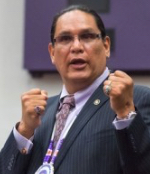
Ernest ‘Ernie’ Stevens Jr. – NIGA Chair
Brandon Yellowbird Stevens is also the adopted son of ERNEST ‘ERNIE’ LLOYD STEVENS JR. – Chairman and National Spokesperson of the National Indian Gaming Association [NIGA].
NIGA selected Fmr. Three Affiliated Nations Chair TEX HALL for its ‘Wendell A. Chino Humanitarian Award’ in 2012.
ERNIE STEVENS JR. was also an Advisor to the BLUE STONE STRATEGY GROUP.
CRISTINA DANFORTH and the Native American Finance Officers Association [NAFOA] gave Tex Hall its Entreupreneur Award in 2012.
Brandon Yellowbird Stevens continues to play dumb – or just stay dumb – about the insidious origins, noxious nature, and indisputable facts surrounding the toxic, fraudulent ‘PYROLYSIS’ boondoggles proposed by Alliance, OSGC, Abdul Latif Mahjoob/ ACTI, and their partner Ron Van Den Heuvel.
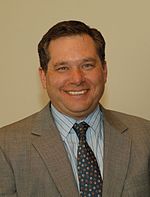 08/2009 : Atty. Carl Artman became Professor of Practice and Director of the Economic Development in Indian Country Program at Arizona State University Sandra Day O’Connor College of Law
08/2009 : Atty. Carl Artman became Professor of Practice and Director of the Economic Development in Indian Country Program at Arizona State University Sandra Day O’Connor College of Law
08/17/09 : ST Paper II, LLC filed Intent to Revoke Certificate of Authority w/ WDFI as a Foreign LLC; Revocation of Certificate of Authority on 10/23/09; Started on 10/11/07; Principal Office 1555 Glory Road, Green Bay, WI; Registered Agent G&K Wisconsin Services, LLC
- ST Paper Holdings II, LLC filed Intent to Revoke Certificate of Authority w/ WDFI as a Foreign LLC; Revocation of Certificate of Authority on 10/23/09; Started on 10/11/07; Principal Office 1555 Glory Road, Green Bay, WI; Registered Agent G&K Wisconsin Services, LLC
09/02/09 : ST Paper Holdings, LLC changed Registered w/ WDFI, and again on 05/19/14, and 03/30/16, and on 03/13/17 to G&K Wisconsin Services, LLC

 09/11/09 : According to the September 20, 2016 Superseding Indictment, Docket No. 16-CR-064, USA v. Ron Van Den Heuvel, Kelly Van Den Heuvel & Paul Piikkila:
09/11/09 : According to the September 20, 2016 Superseding Indictment, Docket No. 16-CR-064, USA v. Ron Van Den Heuvel, Kelly Van Den Heuvel & Paul Piikkila:
10. On or about September 11, 2009, [Paul] Piikkila authorized a loan of $240,000 to Source of Solutions, LLC, one of Ronald Van Den Heuvel’s business entities. Signing the business note for Source of Solutions was [Debra Stary], Ronald Van Den Heuvel’s administrative assistant. These funds were promptly transferred to Ronald Van Den Heuvel’s other business entities, paid out to Ronald Van Den Heuvel’s employees, used to pay off Ronald Van Den Heuvel’s debts to other companies and other banks, and used to make payments against balances due on the loans noted in paragraph e., 7, and 9 above.
11. On or about September 25, 2009, Piikkila authorized a loan of $10,000 to RVDH, Inc. These funds were promptly transferred to another of Ronald Van Den Heuvel’s business entities.
According to the July 1, 2016 Paul Piikkila Plea Agreement in U.S. District Court, Eastern District of Wisconsin Case No. 16-CR-64, United States of America v. Paul J. Piikkila
On or about September 11, 2009, Piikkila approved a loan of $240,000 to Source of Solutions [LLC]. The loan application was signed off on by [Debra Stary]. She served for years as an administrative assistant and jack-of-all-trades for Ron. The witnesses associated with Ron’s businesses all agreed that [Debbie Stary] had no real authority in the company and just acted at Ron’s direction. She was made an officer of Source of Solutions shortly before this loan was taken out. None of the money went to Source of Solutions. Much of the money was transferred to Ron’s other business entities. Some was used to pay for personal expenses of Ron and Kelly, including the Packers luxury box they regularly rented. Lump sum payments were made to employees, including $5,000 to [Debbie Stary]. Payments were made against the other Horicon loans. Piikkila was repaid for having personally covered a short-fall of Ron’s in a different account at Horicon Bank.
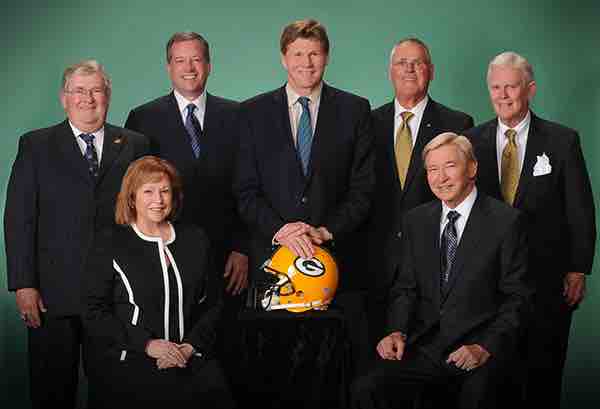
(back row) Mark J. McMullen, Treasurer; Daniel T. Ariens, Secretary; Mark H. Murphy, President; Thomas M. Olejniczak, Member; John F. Bergstrom, Member; (front row) Susan M. Finco, Member; and Thomas L. Olson, Vice President and Lead Director.
According to EXHIBT A of the U. S. District Court, Eastern District of Wisconsin, Docket No. 16-CR-64, United States of America v. Ronald H. Van Den Heuvel,
Paul Piikkila, and Kelly Y. Van Den Heuvel
Debra Stary worked as [Ron] Van Den Heuvel’s secretary for 17-18 years. She was his right hand person, kept all the ledgers and was in charge of and maintained finances. She had no decision making authority.
Debra Stary was the
Vice President of
She didn’t want to
be on the Board but
[Ron] Van Den Heuvel
browbeat her until
she agreed.
[Paul] Piikkila didn’t know if Stary and Van Den Heuvel had a romantic relationship. Van Den Heuvel was intimidating and Piikkila once saw him punch Howard Bedford. They had a fight because Van Den Heuvel approached [Ken Dardis] and asked him to invest $30,000. Bedford told him not to invest. Van Den Heuvel needed the money immediately for the Waste Fiber facility.
- According to the April 15, 2015 FDIC Memorandum of Interview of Paul Piikkila at US Attorney’s Office for the Eastern District of WI
[Paul J.] Piikkila presented the $7.1 million loan [proposal] to the [Horicon Bank] Loan Committee for approval. Piikkila stated that [the] loan purpose was to purchase equipment for the paper mill. Piikkila said that the loan committee denied the loan because they did not like [Ron Van Den Heuvel]’s character. Piikkila reviewed the loan presentation and his attention was brought to the section intended to list the other related loans (Attachment 2). The RVDH [LLC] loan previously discussed was not listed in this section. Piikkila could not explain why he hadn’t listed that loan.
Piikkila restructured the $7.1 million loan [request] several times and presented it to the loan committee. The loan was denied each time.
Piikkila denied multiple times that bank management told him not to loan money to [Ron Van Den Heuvel] or his related businesses. He was presented an email from Schwab to Piikkila which stated that the bank was not interested in loaning to [Ron Van Den Heuvel] unless the loan was collateralized by CDs (Attachment 3). Piikkila did not remember that email. Piikkila stated that he continued to loan to [Ron Van Den Heuvel] because he felt he “could handle” him.
William ‘Bill’ Bain and wife Cynthia Bain – sister of Nature’s Way Tissue Corp.’s Vice-President Debra Stary.
Piikkila stated that [Ron Van Den Heuvel] came to him and asked if he could approve a loan to William Bain [Bill Bain]. Bain is [Ron Van Den Heuvel]’s former brother-in-law [and partner in Ron & Bill Investments LLP, and Vice-President of Vos Electric, Inc.] [Ron Van Den Heuvel] said that he would pledge collateral for the loan.
Piikkila claimed that he thought the loan proceeds would be a split between Bain and [Ron Van Den Heuvel]. Piikkila said that at the closing Bain said he was not going to make any payments to the loan. Piikkila counseled him that he should not sign the loan if he did not understand that he was responsible. Bain then signed for the loan. When asked if he thought this was a red flag, Piikkila said he didn’t think so because Bain was an accomplished businessman and knew what signing for a loan entailed.
Piikkila stated that Kelly Van Den Heuvel, [Ron Van Den Heuvel]’s wife, introduced Julie Gumban … to him for a loan. … Piikkila stated that it seemed as though [Julie] Gumban did not really understand what was going on because she didn’t speak English very well. He thought that Kelly Van Den Heuvel was pushing [Julie Gumban] into getting the loan. Piikkila approved the loan anyway. Piikkila thought that Gumban was investing in KYHKJG, [LLC] owned by Kelly Van Den Heuvel.
Piikkila stated that [Julie] Gumban had taken out previous loans and credit cards for the Van Den Heuvel[s]. Piikila was asked why he approved a loan for Gumban because she had a low credit score…, lots of credit card debt and the unsecured loan was half of her annual salary. Piikkila stated that he thought Gumban’s living expenses were low and therefore she would be able to repay the loan.
Piikkila then admitted that he knew that [Julie] Gumban’s loan would be used to pay down [Ron Van Den Heuvel]’s other loans at Horicon [Bank]. Piikkila stated that he approved this loan so [Ron Van Den Heuvel]’s loans would stay off the watch list.
At this point in the interview Piikkila’s attorney’s asked for a break so they could speak to their client.
After the break,
Piikkila explained
why he thought doing business with [Ron Van Den Heuvel] would be beneficial to the bank. He said that [E.A.R.T.H. / Environmental Advanced Reclamation Technology HQ, LLC / renamed Reclamation Technology Systems, LLC / RTS] was the endgame and Piikkila had full faith that [Ron Van Den Heuvel] would be successful in this venture. After [E.A.R.T.H.] took off, [Ron Van Den Heuvel] would bring his deposits to Horicon [Bank] and this would be a big payoff. Piikkila stated that he did this for his reputation and would hopefully get an additional bonus. Piikkila had worked closely with [Ron Van Den Heuvel] while he was at Anchor Bank and spoke to him on a weekly basis. Piikkila reiterated that he did not know how [Ron Van Den Heuvel] knew that he was at Horicon Bank and did not seek him out for business. …Piikkila made a $250,000 loan to Source of Solutions [LLC]. The authorized signer was Debra Stary. [Ron Van Den Heuvel] made her a Vice President of the company so she could sign for the note to keep [Ron Van Den Heuvel]’s name off the paperwork so [Horicon Bank] management would not notice it. Piikkila added that [Debra] Stary also typed up the lease agreements which were later disputed by the bank.
Piikkila’s attorney’s noted that [Debra] Stary’s signature looked very similar to the renewal signature for the $70,000 KYHKJG line of credit.
Piikkila worked for [Ron Van Den Heuvel] after he was fired from Horicon Bank. He provided some information on [Ron Van Den Heuvel] and potentially defrauded investors. …
Debra Stary and William Bain’s wife [Cynthia Bain] are sisters.
Debra Stary no longer works for [Ron Van Den Heuvel] and is now with NPS [Corp.]. She was very close to [Ron] Van Den Heuvel and would do anything he asked.
Piikkila stated that her family
had an intervention
to get her to quit working for [Ron Van Den Heuvel].
 09/25/09 : According to the July 1, 2016 Paul Piikkila Plea Agreement in U.S. District Court, Eastern District of Wisconsin Case No. 16-CR-64, United States of America v. Paul J. Piikkila
09/25/09 : According to the July 1, 2016 Paul Piikkila Plea Agreement in U.S. District Court, Eastern District of Wisconsin Case No. 16-CR-64, United States of America v. Paul J. Piikkila
The last loan was on or about September 25, 2009 where Piikkila approved a $10,000 loan to Tissue Technology [LLC], another of Ron’s entities. $1,000 was deposited into the Tissue Technology account and the remaining $9,000 was taken out in cash.
A number of categories of evidence tend to prove that Ron acted with fraudulent intent by obtaining these loans through the submission of information he knew to be false.
Of course, he had a motive since these practices allowed him to obtain large quantities of money which he could use for his own purposes. All of the witnesses agree that Ron and Kelly Van Den Heuvel lived a high-end-lifestyle including an expensive house, another residence in Florida, expensive automobiles, a live-in nanny, expansive use of credit cards, and a private plane. All this despite little evidence of actual business activity by any of Ron’s business entities.
The reason for obtaining the loans through straw borrowers was apparent from the circumstances. It had to be done that way because the bank would not loan any money to Ron or his entities. So, it was necessary to put the loans in the names of the straw borrowers, always at amounts of $250,000 or less so that Piikkila did not need to obtain authorization from his superiors at the bank.
The straw borrowers all state that Ron caused them to serve in the role as straw borrowers and that it was all done with [Paul] Piikkila’s knowledge. On the [Bill Bain] loan, there is even a written proposal from Ron to Piikkila about the terms which should be used for that loan.
The fact that Ron was responsible for these loans, rather than the straw borrowers, is supported by the fact that whatever collateral was offered as security for these loans was collateral owned or controlled by Ron, not the straw borrowers.
Once the bank started to try to collect on this collateral after there was default on the loans, the bank representatives learned that the collateral was often inadequate as security for the loans. Property was not worth what it was represented to be worth. Properties were already encumbered such that the bank had inferior position in terms of foreclosing on certain properties. Ownership of some of the collateral was in dispute and it appears that Ron pledged collateral that he did not necessarily own.
Each of the loans was purportedly for some general business purpose such as the purchase of equipment or operating capital. However, the loan proceeds consistently went to pay off old loans, often obtained by the straw borrowers for Ron’s benefit, or to pay off Ron’s personal expenses, not any stated business purpose.
There are various written and oral communications from Ron after the banks started looking into collecting on these loans which show that he acknowledged responsibility for repayment, corroborating the point that these were really his loans, not those of the straw borrowers. That includes email that Ron exchanged with various bank personnel and the straw borrowers, talks he had with individuals tasked by the bank to collect on the loans, and a written repayment agreement he had with [Steven Peters] acknowledging Ron’s responsibility to repay [Steven Peter]’s loans. [William Bain] communicated with Ron about settling his debt to the bank. All of the memo lines on the various [Bill Bain] checks which went to pay off earlier loans refer to the payment of Ron’s earlier loans or notes. Prior to the Source of Solutions loan, Ron and Piikkila exchanged emails making it plain that Ron was the true applicant for that loan.
10/06/09 : PBS, Nightly Business Report – Plastic May Be the Newest Fuel Find
https://youtu.be/9jPhK1OGskY
10/09/09 : CNN, The Situation Room with Wolf Blitzer – Entrepreneur says he strikes gold with our garbage
WASHINGTON (CNN) — Like the alchemists who once tried to turn lead into gold, a green entrepreneur says he has found a cost-effective method for turning plastic trash into oil.
During a recent visit to his new demonstration plant in Maryland, Envion CEO Michael Han describes his process: Waste plastic is shredded and melted and then processed in a way that separates the petroleum from the rest of the ingredients.
At one end of the machinery, shredded plastic trash is dumped in a hopper and goes up a conveyor belt into a “reactor.” At the other end is a spaghetti of pipes and valves and tanks.
Han turns open a spigot on one of the pipes and produces a liquid the color of apple juice. It smells kind of like diesel, and Han claims it’s ready to be processed for any number of uses: fueling cars, diesel generators or even jets.
But not all of the ingredients in plastic can be refined into petroleum. All the chemicals that were added when the plastic was produced must be separated out and collected in a sediment tank.
That could be a problem, says Kert Davies, a researcher with the environmental group Greenpeace. He has not visited the plant, but after reading Envion’s literature, he asked, “what happens to the additives and the metals and the other things?”
Envion is hoping to find asphalt makers who can use the sludge as an ingredient for paving after the metals are filtered out. Otherwise, it can be dried by microwaving and the dust sent to a landfill.
“Then you end up with a different problem,” Davies said. “Is that going to a hazardous waste landfill?”
But Han says that it’s not hazardous, and most important, that the process releases no gas into the air.
“You don’t smell anything burning,” he said. “We don’t incinerate. We simply melt.”
Han set up his demonstration at the Montgomery County dump in Maryland. Amid bales of crushed yogurt containers and plastic bottles, there seems to be little risk that he will run out of trash to feed into his machine.
Envion is pitching the technology to sanitation departments, promising it will cut down on their trash volume by consuming up to 10,000 tons of plastic per year while producing some revenue as well.
The plant could produce up to 60,000 barrels of oil a year, Han says, and although some of that oil is used to keep the machinery running, the rest can be sold to an oil company for profit.
The plant cost $4 million to build, but Han says it can produce oil for as little as $10 a barrel at a time when oil is selling for more than $70 a barrel.
Davies said that “finding new oil to burn is not the goal. The goal should be to burn less oil.”
But Han said, “if there’s a way that we can solve the problem of accumulation of waste plastic in our country and at the same time turn it into a byproduct that is cost effective, then I think it’s a win-win situation.”
10/23/09 : ST Paper II, LLC filed Revocation of Certificate of Authority w/ WDFI as a Foreign LLC; Principal Office: 1555 Glory Road, Green Bay, WI; Registered Agent G&K Wisconsin Services, LLC; Started on 10/11/07
- ST Paper Holdings II, LLC filed Revocation of Certificate of Authority w/ WDFI as a Foreign LLC; Principal Office: 1555 Glory Road, Green Bay, WI; Registered Agent G&K Wisconsin Services, LLC; Started on 10/11/07
 11/09/09 : OSGC signed the Legislative Award Agreement WI Dept. of Commerce Contract #LEG FY10-19812 which states:
11/09/09 : OSGC signed the Legislative Award Agreement WI Dept. of Commerce Contract #LEG FY10-19812 which states:
WHEREAS, 2009 Wisconsin Act 28 authorizes the Department to make an annual grant of $1,000,000.00 in each of the year 2009- 11 biennium to Oneida Seven Generations Corporation from funds encumbered in the appropriation under section 20.143 (kj) in the statutes of previous years but not disbursed for grants to Oneida Small Business Inc. and Project 2000 from the gaming economic diversification grant and loan program.” (2009–2011 WI Dept. of Commerce disbursed $2,000,000.00 to OSGC). …
(ii) The Recipient shall provide documentation that the grant funds were expended as outlined in LEG FY10-19812 Exhibit B.
(iii) The Recipient shall submit a detailed audit of how the funds were expended by the Recipient documenting how the grant funds were used to establish a state-of-the-art energy recovery facility in Brown County within 6 months of spending that amount of the grant.
(iv) The Recipient shall provide a detailed report describing the results achieved for the project related to the energy recovery facility established in Brown County. The report shall include information regarding the volume of waste processed (MSW) as well as the amount of energy generated and converted into electricity. The report shall also include an estimate of the amount of methane reduction, the number of full-time positions created and the potential for assembly or manufacturing operations as a result of the project.”
Oneida Seven Generations Corporation is the majority shareholder in IEP Development, LLC, a consulting firm specializing in cooperative energy research & development and advisory due diligence to independent energy projects and economic development. IEP is focused on developing and promoting biomass technologies that reduce landfill waste, captures methane and reduce carbon production.
Oneida Energy, LLC will be formed by IEP Development, LLC to engage in for profit energy recovery and electric generation operations. Oneida Energy will provide waste disposal and energy recovery through the use of technology that harnesses the energy of waste and other economically suitable materials and converts the energy to electricity. The by-product of this material is a carbon char that can be sold as a value added product. The system will be designed to operate 24 hours per day, 365 days per year with required maintenance every 2,000 hours of operation.
During the demonstration phase, the facility will employ 6-8 individuals. A fully expanded site in the future may employ from 16 to 24 individuals. The facility will be located on the Oneida Reservation, adjacent to an existing waste transfer station operated by Brown County. The waste transfer station is also located at the site of a capped landfill that will provide landfill gas to the project in addition to the waste stream.
IEP has reached agreements with several vendors for their placement of proprietary systems for gasification of metropolitan solid waste. IEP focused on technologies and systems that do not use any type of incineration and instead use EPA approved clean gasification systems to produce the thermal flow (heat) that can be directed into a number of off-the-shelf generation systems to produce electricity at an economical rate of power production. …

ACTI’s Abdul Latif Mahjoob
In conjunction with joint venture partner AITI [sic; ACTI or another version of Abdul Latif Mahjoob‘s American Combustion Technology, Inc.], IEP can acquire rights to manufacture and assemble the products and has exclusivity to market the waste-to-energy systems to tribal, municipal and county governments throughout the United States. Power purchase agreements will comprise approximately 90% of the revenue stream from the IEP system. Initially, the demonstration phase will be able to convert up to 50 tons per day of municipal solid waste, with a peak power of 6-8MW, annually producing 60,000,000 KWH providing which should provide approximately $4.8 million annually in power sales. Once complete the site can quickly be expanded to process up to 120 tons per day and 5MW of electricity production. …
The company is working with the Bureau of Indian Affairs for project financing. The Oneida Tribe will set aside approximately 50 acres for the project for a value of $1.2 million. OSGC will manage the lease of this property as well as commit $800,000 of value in the way of office staff, office space, administration costs and money.
According to another Exhibit B – the ‘CONFIDENTIAL’ brochure titled ‘GREEN BOX NA, LLC: Sound Path to biomass’s most efficient technologies’ which was attached to the March 20, 2013 Amended Complaint and Jury Trial Demand, Brown Co. Case No, 13CV463, Marco Araujo, M.D. v. Ronald Van Den Heuvel and Green Box NA, and cites ACTI operating in Los Angeles; Carson, CA; and Paramount, CA:
GREEN BOX
Five steps:
1. Sourcing and Collecting biomass: waste streams from fast food, amusement park, and others: 500 [Tons Per Day]
2. Sorting: brown paper, poly coated papers, white papers,…
3. Pulping Technology center: brown white tissues, cup making 200 TPD
4. Pelletizing the by-products
5. Producing energy: either electricity, bio-diesel or both.
No water discharge, no waste stream; ash ever every energy generation can still be used for soil nutriment (no organic) or road construction …
The base project has an attractive payout and funds the commercial proof of two competing technologies to provide an even higher return using the 300 TPD of fuel pellets as a feedstock. The two technologies to be funded are:
1. Pyrolysis to produce gas and diesel fuel that has been proven at pilot scale and smaller commercial scale.
2. Higher efficiency process that has been proven at a pilot scale to produce a higher return.
 11/16/09 : The Securities & Exchange Commission filed a Motion for Ex Parte TRO against Mantria Corp. principals Troy Wragg, Amanda Knorr, and Wayde McKelvy; two hearings were held; Motion was granted
11/16/09 : The Securities & Exchange Commission filed a Motion for Ex Parte TRO against Mantria Corp. principals Troy Wragg, Amanda Knorr, and Wayde McKelvy; two hearings were held; Motion was granted
 11/18/09 : According to the November 13, 2013 Complaint in Brown Co. Case No. 13CV1838, Oneida Small Business Inc. v. Cristina S. Danforth, Paul F. Danforth & White Eagle Sports Bar & Grill, LLC…
11/18/09 : According to the November 13, 2013 Complaint in Brown Co. Case No. 13CV1838, Oneida Small Business Inc. v. Cristina S. Danforth, Paul F. Danforth & White Eagle Sports Bar & Grill, LLC…
former OBC Treasurer & Chair Cristina Danforth’s business – White Eagle Sports Bar & Grill, LLC – executed a Business Note and refinanced previous Notes regarding money borrowed from Oneida Small Business, Inc.
White Eagle Sports Bar & Grill is located at 2994 E. Service Road, Oneida, WI, 54155 …
 the exact same address as ALL NATIONS ENERGY ALLIANCE, LLC, for which the Registered Agent is Mark Anthony Sweet …
the exact same address as ALL NATIONS ENERGY ALLIANCE, LLC, for which the Registered Agent is Mark Anthony Sweet …
affiliated with ALL NATIONS DEVELOPMENT ALLIANCE, LLC registered w/ Minnesota Secretary of State on 04/04/10: Manager: Mark Anthony Sweet; Registered Office: 7241 Ohms Ln. #275, Edina, MN, 55439; Principal Office: 350 N. Main Street, Suite 236, Stillwater, MN, 55082.
On 05/17/10 White Eagle II, LLC was Registered w/ WDFI, and renamed All Stars Pub & Grill, LLC on 04/03/12.
White Eagle Sports Bar & Grill was temporarily renamed All Stars Pub & Grill, and has reverted back to the name White Eagle Sports Bar & Grill.
![]() 12/01/09 & 02/09/10 Preliminary Injunction Hearing; Court grants SEC’s Motion for Preliminary Injunction, entered Order for Preliminary Injunction, Asset Freezes, and Other Equitable Relief, Civil Action No. 09-cv-02676, SEC v. Mantria Corp., Wragg, Knorr, & McKelvy
12/01/09 & 02/09/10 Preliminary Injunction Hearing; Court grants SEC’s Motion for Preliminary Injunction, entered Order for Preliminary Injunction, Asset Freezes, and Other Equitable Relief, Civil Action No. 09-cv-02676, SEC v. Mantria Corp., Wragg, Knorr, & McKelvy
12/21/09 : December 21, 2009 Order Denying Defendant’s Motion for Summary Judgment and Granting Defendant’s Alternative Motion to Stay, U.S. District Court for Western District of Washington at Tacoma Case No. C09-5008, ORGANIC ENERGY CONVERSION COMAPNY, a Washington limited liability company v. FLAMBEAU RIVER PAPERS, LLC, a Wisconsin limited liability company; FOUNTAINHEAD ENGINEERING LTD., a Michigan limited liability company
A. The Wisconsin Action
On June 19, 2008, Flambeau, Johnson Timber Corporation and William Johnson (collectively “Wisconsin Plaintiffs”) filed a complaint against Organic Energy Conversion Company (“OECC”) in Price County Circuit Court in Wisconsin. Dkt. 6-2. Johnson Timber is a Wisconsin corporation, and Mr. Johnson is its principal shareholder and chief executive officer. Mr. Johnson, a resident of Wisconsin, is also the CEO of Flambeau, as well as the sole member of Summit Lake Management, LLC, which is the managing member of Flambeau.
According to the complaint, in February 2008, OECC and Flambeau entered into a non-binding memorandum of understanding (“MOU”), which called for Flambeau to make a payment of $600,000 to OECC that was to be used exclusively by OECC for the development and construction of a specified product. Under the MOU, OECC and Flambeau were to successfully test the product no later than April 1, 2008, and the product was to be delivered to Flambeau’s Park Falls, Wisconsin facility no later than May 1, 2008. Flambeau maintains that it paid the initial $600,000 to OECC for production and development of the product.
When it became apparent that OECC could not deliver the product as promised, Mr. Johnson met with individuals purporting to be authorized representatives of OECC in an attempt to find a business solution to the problem. Those discussions led to the signing of a term sheet, which expressed the parties’ desire to explore a joint-venture type relationship relating to the product. Under the term sheet, all equipment and other items necessary for completion of the product would be delivered to the Park Falls facility, and OECC would dispatch an authorized representative to the facility to “ensure the successful manufacture and assembly” of the product. The Wisconsin Plaintiffs maintain that the term sheet is a non-binding document “merely setting forth the good-faith intentions of the parties for the structure of the joint-venture relationship. The term sheet explicitly calls for subsequent agreements to be reached and entered into between OECC and one or more of the [Wisonsin] Plaintiffs, although it does not identify which specific parties are to be participants in the contemplated joint venture.” Id. at 7. The term sheet also calls for a subsequent operating agreement to be entered into as part of the joint venture relationship. The Wisconsin Plaintiffs maintain that the parties have not negotiated or entered into an operating agreement.
Additionally, the term sheet provided that once the operating agreement has been executed and the joint venture established, Mr. Johnson and/or one of the other Wisconsin Plaintiffs was to pay OECC $1 million in ten equal installments. The Wisconsin Plaintiffs maintain that, although no joint venture had been established, Mr. Johnson, “as a gesture of good faith,” caused the first installment to be made to OECC on May 2, 2008.
On May 28, 2008, Mr. Johnson received information from Butch Sadikay, who identified himself as a 50% owner of OECC, “caution[ing] Mr. Johnson from continuing to do business with OECC without further discussion between them.” Id. at 8. Based on this information, as well as a subsequent phone conversation, the Wisconsin Plaintiffs believed that “it [did] not appear … that the individuals who signed the MOU and the term sheet were authorized to do so on behalf of [OECC].” Id.
Flambeau contends that it demanded an accounting of the $600,000 because OECC never completed the product. Flambeau further maintains that OECC has requested an installment payment pursuant to the term sheet, and that OECC characterized the term sheet as a “binding contract.”
In the Wisconsin action, the plaintiffs seek a declaratory judgment that they owe no contractual obligations requiring payment to OECC. The Wisconsin Plaintiffs also seek an accounting for the $600,000 Flambeau allegedly paid to OECC. OECC asserted several affirmative defenses in its answer, including (1) lack of personal jurisdiction, (2) improper jurisdiction and venue because key discussions and agreements took place in Washington where key witnesses still reside, and (3) improper jurisdiction and venue because Flambeau signed a written agreement promising that disputes arising out of the terms of the parties’ relationship could only be commenced in Pierce County, Washington. Id., 14-15.
B. OECC’s Washington Action
On November 10, 2008, OECC filed a complaint against Flambeau and Fountainhead Engineering, Ltd. (“Fountainhead”), in Pierce County Superior Court in Washington. Dkt. 1, 9-13. On January 8, 2009, Defendants Flambeau and Fountainhead removed the Washington action to this Court. Id., 1-5. OECC alleges two causes of action: (1) breach of contract based on Flambeau’s and Fountainhead’s alleged breach of a mutual non-disclosure agreement (“MNDA”), and (2) conversion based on Flambeau’s and Fountainhead’s alleged conversion of OECC’s intellectual or other property. According to this complaint, OECC developed “valuable and confidential technology and process for non-thermal drying of biosolids and biomass.” Id. at 10. This technology and process was the subject of a confidential patent application filed with the United States Patent and Trademark Office on December 12, 2007. OECC agreed to give access to this patent application to Flambeau and Fountainhead for the purpose of furthering a possible business relationship between the parties to develop, manufacture and sell a non-thermal biomass dryer to the timber industry (referred to by the parties as the “Possible Transaction”). To that end, the parties entered into the MNDA, which is dated December 11, 2007. The MNDA provides in part:
Neither Party will use, or permit any of its Representatives to use, any of the other Party’s Confidential Information for any purpose other than in connection with the evaluation of the Possible Transaction, and neither Party will make any such Confidential Information available to any Person for any other 2 purpose whatsoever.
Dkt. 1 at 16.
The MNDA also includes a provision that requires “any legal proceedings arising out of the terms of [the MDNA] … be commenced in the courts located in Pierce County [Washington].” Id. at 21.
OECC alleges that Flambeau and Fountainhead “repudiated the existence of any business relationship with [OECC]” and claimed to have built their own non-thermal biomass dryer with the assistance of Mr. Johnson and Johnson Timber. OECC maintains that Defendants’ biomass dryer wrongfully uses OECC’s confidential information in violation of the MNDA. …
…[I]t is hereby ORDERED as follows:
1. Defendants’ motion for summary judgment (Dkt. 24) is DENIED.
2. Defendants’ motion to temporarily suspend proceedings (Dkt. 25) until after trial in Wisconsin and for a status conference immediately thereafter is GRANTED.
DATED this 21st day of December, 2009.
SEE ALSO:
Philip Bridges
Mr. Bridges has 30 years experience in pyrolysis/gasification applications related to the waste management business. Mr. Bridges is a owner/principal of Ambient Energy, LLC, which assists clients in developing waste stream solutions through pyrolysis/gasification technology.Michael Lindberg
Mr. Lindberg has been in the green industry for 10 years, with the last five at Ambient Energy, LLC. He has an extensive background in business development, financing, risk management, project costing and revenue forecasting.James N. Jory, Jr.
He has been an attorney in private practice, licensed in Washington State, and his areas of specialization included international business, business transactions, securities law, civil litigation and employment law.
![]() 12/29/09 : PC Fibre Technology, LLC registered w/ WDFI; Change of Registered Agent on 10/15/12, and 11/10/14, and 11/10/16 to Reclamation Technology Systems, LLC [RTS; formerly EARTH and Nature’s Choice Tissue, LLC] currently managed by Stephen Smith‘s GlenArbor Partners, LLC]
12/29/09 : PC Fibre Technology, LLC registered w/ WDFI; Change of Registered Agent on 10/15/12, and 11/10/14, and 11/10/16 to Reclamation Technology Systems, LLC [RTS; formerly EARTH and Nature’s Choice Tissue, LLC] currently managed by Stephen Smith‘s GlenArbor Partners, LLC]
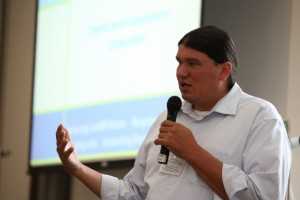
Atty. William ‘Bill’ Cornelius
01/04/10 : January 4, 2010 GTC Annual Meeting & Report from OSGC:
The five board members include
William Cornelius, Chairman;
Jim VanStippen;
Mike Metoxen;
and Nathan King.
We currently have one vacant position. …OSGC continues to lease out the property under its control;
OSGC is continuing to work on various energy projects; IEP.
Material changes and developments since the last report in the business described: Badger Sheet Metal.
Any material pending legal proceedings to which the Corporation is a party; OSGC is pursuing legal action against Nature’s Way Tissue Corporation for the investment amount.
OSGC [subsidiary Glory, LLC] is also pursuing legal action against Nature’s Way Tissue Corporation for the back rent.
And; financial statements of the Corporation, including a consolidated balance sheet and consolidated statement of income and source and application of fund. Financial statements submitted under separate cover to Business Committee at the quarterly meeting October 28th, 2009. …
OSGC has partnered with MH Resources Corp. [Marc Hess] to form IEP [Development, LLC] which is currently vetting different renewable energy projects. OSGC secured a Wisconsin state grant that will help fund various projects[.] …
OSGC has executed a Life Settlement contract that will allow OSGC to receive seed money from outside resources beyond the Oneida Tribal budget.
• $1,227,880.01 MONEY JUDGMENT AGAINST TISSUE TECHNOLOGY, LLC on 09/06/13 : Judgment, Brown Co. Case No. 09CV439, Glory LLC v. Ron Van Den Heuvel & Tissue Technology LLC [and dismissed defendants: Partners Concepts Development Inc; Custom Paper Products Inc; Nature’s Choice Tissue LLC; Purely Cotton Products Corp; Eco Fibre Inc; ReBox Packaging Inc; Tissue Products Technology Corp; Patriot Project Services LLC; Chat LLC; Patriot Investments LLC; Patriot Services Inc; RVDH Inc; Waste Fiber Technology Inc; Recovering Aqua Resources Inc; RV Jet Inc; KYHKJG LLC; Patriot Paper Services Inc; Fibre Solutions LLC; Doc-U-Mince LLC; and dismissed third-party defendants: Ross J. Nova; Godfrey & Kahn.]
CLICK HERE FOR TIMELINE PART 4
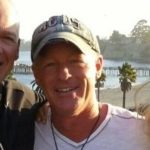
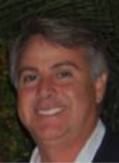

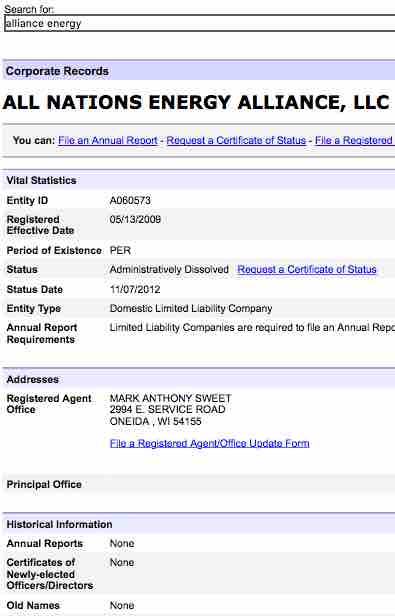
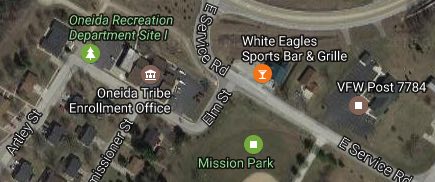


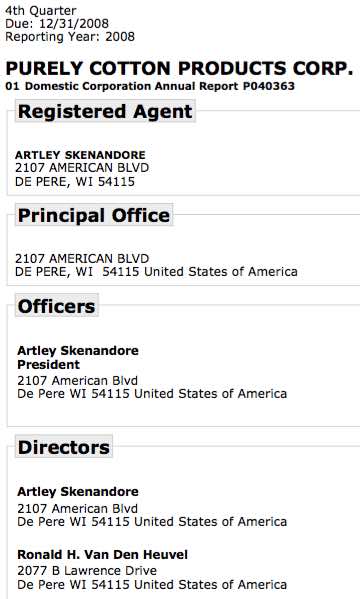


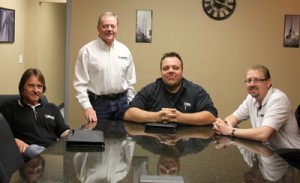
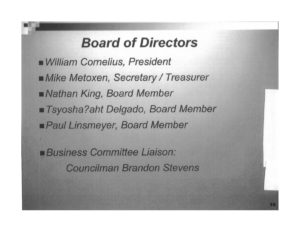
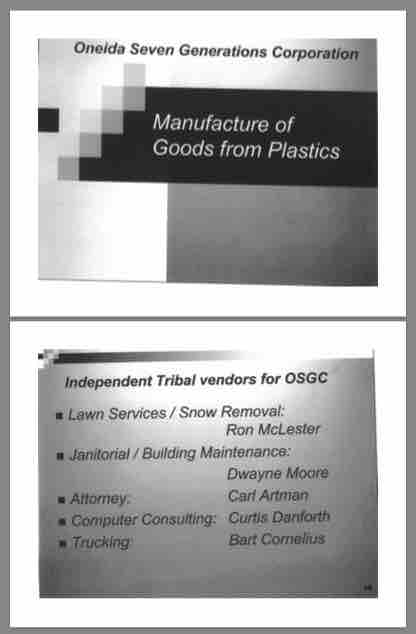

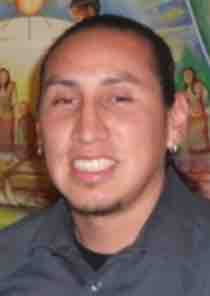
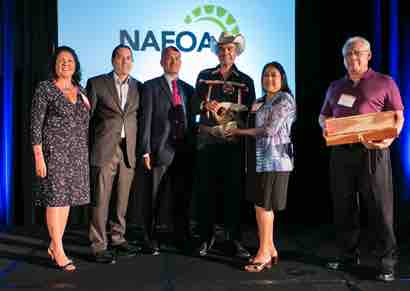




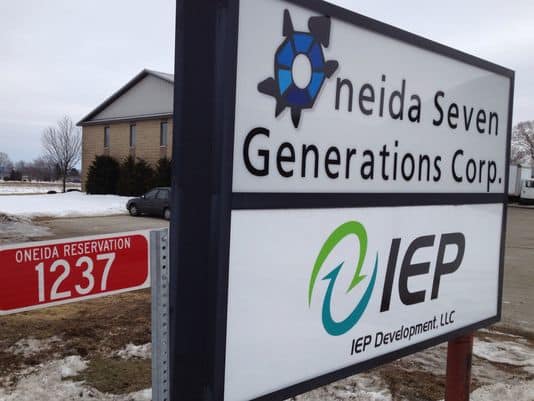 LEG FY10-19812 – EXHIBIT B : THE SCHEME of OSGC / GBRE / IEP / ACTI … and RON VAN DEN HEUVEL / GREEN BOX NA, LLC
LEG FY10-19812 – EXHIBIT B : THE SCHEME of OSGC / GBRE / IEP / ACTI … and RON VAN DEN HEUVEL / GREEN BOX NA, LLC